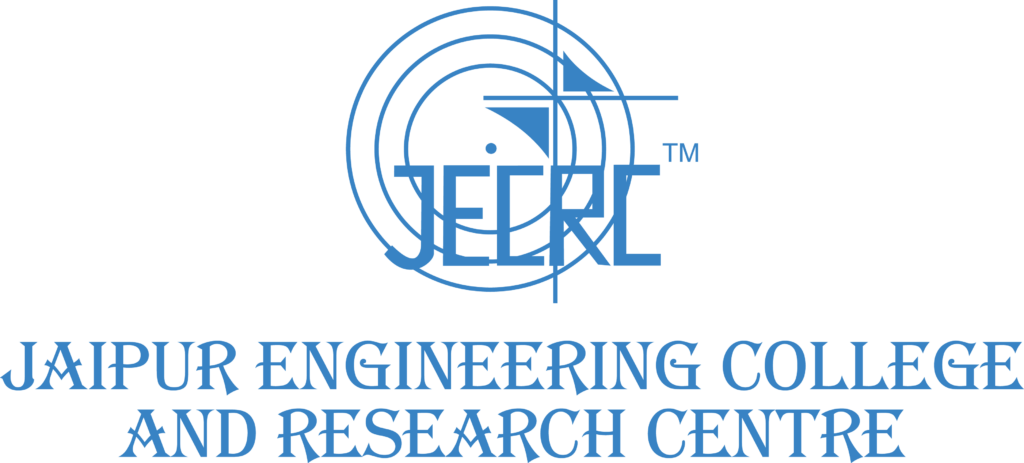
Jaipur Engineering College And Research Centre
Approved By AICTE & Affiliated To RTU

Jaipur Engineering College And Research Centre
Approved By AICTE & Affiliated To RTU


The Department of Computer Science & Engineering is one of the major departments established to meet the demand for well-qualified computer professionals and was established in the year 2001. The Department offers a 4-year degree program in Computer Science and Engineering. The program focuses on theoretical computer science as well as software and application development.
The Department has provided well equipped computer labs with latest computer software and technologies.The Laboratories are installed with broadband internet facility to which students have open access to use the facilities in their best interest. The department ensures that program objectives are constantly met and learning outcomes are monitored through periodical test and assignment.
Highly qualified , efficient and vibrant faculty members with extensive teaching experience dedicatedly work for the betterment of the students and are scrupulous in giving their best.Faculty members hold postgraduate and undergraduate degrees from renowned institutions with specialization in different subjects. Most of the faculty members are actively involved in projects, research work and regularly publishing their research papers in Journals and Conferences.
Established in 2001 with an initial intake of 60 students, the Computer Science & Engineering Department has grown significantly and is now one of the largest and most prestigious departments of the institute with a current student intake of 420 and faculty strength of 59. The department is committed to delivering high-quality education and fostering innovation in the field of Computer Science & Engineering.The department offers B.Tech. in Computer Science & Engineering, providing students with a strong theoretical Knowledge as well as hands-on experience. Also, well equipped laboratories where students can bridge the gap between theoretical concepts and practical applications under the guidance of experienced faculty members.
Ranked among the top engineering departments in India, the department has been on a continuous path of excellence, thanks to its dedicated and highly qualified faculty. The faculty strength includes:
All faculty members hold Master’s /Ph.D degrees from prestigious institutions, including IITs, NITs, and other globally recognized universities. Their expertise and commitment ensure that students receive a world-class education, preparing them for successful careers in the evolving field of computer engineering.
To become renowned Centre of excellence in computer science and engineering and make competent engineers & professionals with high ethical values prepared for lifelong learning.
M1. To impart outcome based education for emerging technologies in the field of computer science and engineering.
M2. To provide opportunities for interaction between academia and industry.
M3. To provide platform for lifelong learning by accepting the change in technologies.
M4. To develop aptitude of fulfilling social responsibilities.
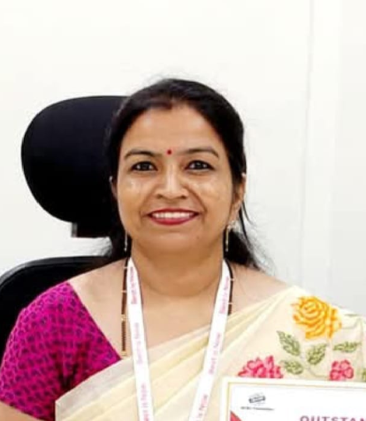
Computer Science & Engineering Program works with efficiency and added strength in a manner which focuses on providing the best. With the continuous evolution in technology and computer science, the department marches hand in hand with this progress, never letting the knowledge offered to students lag behind under any circumstances.
We nurture a student’s needs to stimulate and grow boundlessly, and offer an environment inducing mind’s capabilities to comprehend and infer. With regular training sessions, workshops, national and international conferences, CSE Department makes sure that the student’s get the best exposure, to develop their own selves.
Our department has a team of qualified and experienced faculty and staff members. We are striving hard continuously to improve upon the quality of education and to maintain its position of leadership in Engineering and technology.
Best of luck to everyone!
Dr. Vijeta Kumawat
Program Co-ordinator, CSE
To get any additional information regarding the Department of Computer Science & Engineering, you can reach us at:
The Department is affiliated to Rajasthan Technical University and offers Under-Graduate programmes.
The CSE Department practices the Outcome Based Education (OBE) approach for teaching-learning process. This is a learning-centric approach rather than traditional teaching-centric approach to education. This approach focuses on the attributes the students should possess after the completion of the programme through the following key questions:
Under OBE model, the quality of teaching is measured by the quality of learning, defined as outcomes, that takes place. Programme Educational Objectives (PEOs) are formulated to align with the vision and mission of the Department. Programme Outcomes (POs) are defined to achieve PEOs which are further aligned to Course Outcomes (CO) of each subject. Vision, Mission and PEOs are the long-term outcomes whereas POs and COs are the short-term outcomes.

1. Engineering knowledge: Apply the knowledge of mathematics, science, engineering fundamentals, and computer science engineering specialization to the solution of complex computer science engineering problems.
2. Problem analysis: Identify, formulate, research literature, and analyze complex computer science engineering problems reaching substantiated conclusions using first principles of mathematics, natural sciences, and engineering sciences.
3. Design/development of solutions: Design solutions for complex computer science engineering problems and design system components or processes that meet the specified needs with appropriate consideration for the public health and safety, and the cultural, societal, and environmental considerations.
4. Conduct investigations of complex problems: Use research-based knowledge and research methods including design of computer science engineering experiments, analysis and interpretation of data, and synthesis of the information to provide valid conclusions.
5. Modern tool usage: Create, select, and apply appropriate techniques, resources, and modern computer science engineering and IT tools including prediction and modeling to complex computer science engineering activities with an understanding of the limitations.
6. The engineer and society: Apply reasoning informed by the contextual knowledge to assess societal, health, safety, legal and cultural issues and the consequent responsibilities relevant to the professional computer science engineering practice.
7. Environment and sustainability: Understand the impact of the professional computer science engineering solutions in societal and environmental contexts, and demonstrate the knowledge of, and need for sustainable development.
8. Ethics: Apply ethical principles and commit to professional ethics and responsibilities and norms of the computer science engineering practice.
9. Individual and team work: Function effectively as an individual, and as a member or leader in diverse teams, and in multidisciplinary settings.
10. Communication: Communicate effectively on complex computer science engineering activities with the engineering community and with society at large, such as, being able to comprehend and write effective reports and design documentation, make effective presentations, and give and receive clear instructions.
11. Project management and finance: Demonstrate knowledge and understanding of the computer science engineering and management principles and apply these to one’s own work, as a member and leader in a team, to manage projects and in multidisciplinary environments.
12. Life-long learning: Recognize the need for, and have the preparation and ability to engage in independent and life-long learning in the broadest context of computer science engineering change.
PEO1. To provide students with the fundamentals of Engineering Sciences with more emphasis in computer science and engineering by way of analyzing and exploiting engineering challenges.
PEO2. To train students with good scientific and engineering knowledge so as to comprehend, analyze, design, and create novel products and solutions for the real life problems.
PEO3. To inculcate professional and ethical attitude, effective communication skills, teamwork skills, multidisciplinary approach, entrepreneurial thinking and an ability to relate engineering issues with social issues.
PEO4. To provide students with an academic environment aware of excellence, leadership, written ethical codes and guidelines, and the self-motivated life-long learning needed for a successful professional career.
PEO5. To prepare students to excel in Industry and Higher education by Educating Students along with High moral values and Knowledge.
3rd Semester Subjects
Subject: Advanced Engineering Mathematics Code: 3CS2-01
CO-1 | Solve the Linear, Non Linear and Transportation problems by the Optimization Techniques |
CO-2 | Explain the concept of divisibility, Congruence, Prime and Prime factorization. Describe the properties of the Group, Ring and Field. |
CO-3 | Solve the Ordinary and Partial Differential equations by use of Laplace Transform |
CO-4 | Use numerical methods for Differentiation and Integration, solve Difference and Differential equations and also develop the algorithm for numerical methods. |
Subject: Managerial Economics and Financial Accounting Code: 3CS1-03
CO-1 | Apply Economic principles to management decisions |
CO-2 | Understand the market systems & the pricing theory based on demand & supply, production & cost analysis |
CO-3 | Able to analyse Financial interpretation on the basis of basic financial concepts |
CO-4 | Apply Economic principles to management decisions |
Subject: Digital Electronics Code: 3CS3-04
CO-1 | Understanding Boolean algebra, conversions and minimization techniques. |
CO-2 | Creating various combinational and sequential circuits |
CO-3 | Understanding different logic families |
CO-4 | Creating of circuits using different minimization techniques. |
Subject: Data Structures and Algorithms Code: 3CS4-05
CO-1 | Understand different type of data structures and their measuring parameters |
CO-2 | Implement various data structures |
CO-3 | Analyze various measuring parameters and data structures(Linear/Non-Linear) |
CO-4 | Apply the knowledge of various data structures in basic applications of programming |
Subject: Object Oriented Programming Code: 3CS4-06
CO-1 | Identify and analyze Object Oriented Programming concepts in designing solution of a problem. |
CO-2 | Apply constructor, friend function and class when analyzing a problem statement. |
CO-3 | Apply and analyze features of inheritance and polymorphism for developing solution of a complex problem. |
CO-4 | Identify and handle exceptions in an object oriented program. Perform generic programming using templates. |
Subject: Software engineering Code: 3CS4-07
CO-1 | understand the purpose of designing a system and evaluate the various models suitable as per its requirement analysis |
CO-2 | understand and apply software project management, effort estimation and project scheduling |
CO-3 | formulate requirement analysis, process behavior and software designing |
CO-4 | Implement the concept of object oriented analysis modeling with the reference of UML and advance SE tools |
Subject: DSA LAB Code: 3CS4-21
CO-1 | Apply the concepts of data type, data structure and array data structure and analyze the algorithms. |
CO-2 | To implement standard algorithms of linear and non- linear data structures to solve various computing problems. |
CO-3 | To implement standard algorithms for searching & sorting and identify when to choose which technique. |
Subject: OOPS LAB Code: 3CS4-22
CO-1 | Understand and articulate the object-oriented approach for developing software programs using C++ |
CO-2 | Analyze and develop programs for reuse and maintainability to solve real time problems using C++ |
Subject: SE LAB Code: 3CS4-23
CO-1 | To understand Software Requirement Analysis, CASE Tools, Software Testing, and other configuration tools. |
CO-2 | To understand Functional Modeling (DFD), Data Modeling (DFD) – Use work products – data dictionary. |
CO-3 | An ability to understand the Structural and Behavioral UML Diagrams with the use of Project Management Tool – ProjectLibre. |
Subject: DE LAB Code: 3CS4-24
CO-1 | Identify the various digital IC’s and understand their Operation. |
CO-2 | Apply Boolean Law to Simplify the digital circuits and design simple logic circuits. |
Subject: INDUSTRIAL TRAINING Code: 3CS7-30
CO-1 | Generate the report based on the Projects carried out for demonstrating the ability to apply the knowledge of engineering field during training |
CO-2 | Demonstrate Competency in relevant engineering fields through problem identification, formulation and solution |
4th Semester Subjects
Subject: Discrete Mathematical Structures Code: 4CS2-01
CO-1 | Understand the concept and operations of Sets, Functions and Relations. |
CO-2 | Explain and construct proofs by certain methods. |
CO-3 | Understand the concepts of graphs and trees and their use to visualize and simplify situations. |
CO-4 | Understand the concepts of logics and their uses. |
Subject: Technical Communication Code: 4CS1-02
CO-1 | Able to express themselves better in technical writing by understanding the concept, style and methodology used in Technical communication. |
CO-2 | Able to pursue higher studies by working on all aspects of English Language and also develop a better understanding of process and design of technical texts. |
CO-3 | Able to get an in depth knowledge of technical communication used in professional life by getting to know all the forms and aspects of Technical Communication. |
CO-4 | Able to get advanced knowledge of writing strategies by practicing on the structure and formats of Technical documents. |
Subject: Microprocessors and Interfaces Code: 4CS3-04
CO-1 | Demonstrate the taxonomy of 8085 Microprocessor Architecture and knowledge of contemporary microprocessor and their functionalities |
CO-2 | Demonstrate Assembly Language Programming using the various addressing Modes, Debugging Technique and instruction set of 8085 Microprocessor. |
CO-3 | Understand the concept of advance assembly language programming and its implementation |
CO-4 | Analyze and design of 8255,8254,8279,8251 and interfacing with various devices. |
Subject: Database Management System Code: 4CS4-05
CO-1 | Design an ER model for an enterprise |
CO-2 | Perform and analysis Query database using Relational Algebra, Relational Calculus and SQL |
CO-3 | Apply normalization based on functional dependency. |
CO-4 | Illustrate for serializability among concurrent transactions and apply concurrency control protocols, and Outline database recovery techniques |
Subject: Theory of Computation Code: 4CS4-06
CO-1 | Examine Finite Automata and Regular Expression. |
CO-2 | Classify regular sets of Regular Grammars. |
CO-3 | Categorize Context Free Language and Design Pushdown automata. |
CO-4 | Design Turing machine, compare Chomsky hierarchy languages and analyze Linear bounded automata. |
Subject: Data Communication and computer.
Code: 4CS4-07
CO-1 | Understand the principles of Network Protocols and OSI and TCP/IP model. |
CO-2 | Analyze and implement the concepts of various protocols of Error Detection and Correction |
CO-3 | Analyze and apply the concept of various Routing algorithms and principles of reliable data transfers along with transactional TCP and associated congestion control. |
CO-4 | Classify role of application layer, its various elements like WWW, DNS FTP and network security. |
Subject: MP LAB Code: 4CS4-21
CO-1 | To understand the assembly level programming concepts. |
CO-2 | Design and implement programs on 8085 microprocessor trainer kit. |
Subject: DBMS LAB Code: 4CS4-22
CO-1 | Design a database for a system and understand the requirement and design methodology of system. |
CO-2 | Perform queries, operations and retrieve data from the database using SQL. |
Subject: NP LAB Code: 4CS4-23
CO-1 | Understand different protocols for Networking Programming Algorithms. |
CO-2 | Implement socket Programming and analyze different (Client/ Server) |
Subject: LSP LAB Code: 4CS4-24
CO-1 | To Apply basic commands of Linux and commands related to inode, I/O redirection and piping, process control and mails. |
CO-2 | To analyze variety of problems of shell script using looping, case structures in the shell script programming. |
Subject: JAVA LAB Code: 4CS4-25
CO-1 | Develop an in depth understanding of programming & apply by writing Object Oriented programs in Java |
CO-2 | Understand & Develop packages, Interfaces, Strings and exception handling in Java |
CO-3 | Create applications involving file handling, concurrency and applet |
5th Semester Subjects
Subject: ITC
Code: 5CS3-01
CO-1 | Apply the fundamental concepts of information theory viz. entropy, mutual information and channel capacity in communication system. |
CO-2 | Examine the principles of source coding and data transmission. |
CO-3 | Analyze linear block code, cyclic code and Convolution code. |
CO-4 | Evaluate information theoretic methods to novel settings of encoding and decoding techniques. |
Subject: CD
Code: 5CS4-02
CO-1 | Compare different phases of compiler and design lexical analyzer. |
CO-2 | Examine syntax and semantic analyzer by understanding grammars. |
CO-3 | Illustrate storage allocation and its organization & analyze symbol table organization. |
CO-4 | Analyze code optimization, code generation & compare various compilers. |
Subject: OS
Code: 5CS4-03
CO-1 | Demonstrate the concepts, structure design of operating system and analysis of process management. |
CO-2 | Recognize the concepts, implementation of memory management policies, design issues of paging and virtual memory. |
CO-3 | Understand and design the concepts of deadlock handling and device management. |
CO-4 | Analyze the file system structure, implementation process and acquainted with various types of operating systems. |
Subject: CG&M
Code: 5CS4-04
CO-1 | Implement geometric images using graphical input techniques |
CO-2 | Design and develop images with the help of 2D & 3D transformations. |
CO-3 | Identify visible surfaces for generation of realistic graphics display and curves representation. |
CO-4 | Analyze multimedia and animation techniques. |
Subject: AA
Code: 5CS4-05
CO-1 | Understand and analyzing the algorithms with different techniques |
CO-2 | Discuss various design strategies for implementing algorithms |
CO-3 | Implement various divide and conquer, greedy and dynamics strategies based algorithms |
CO-4 | Classify the algorithms and problems in various categories like NP, NP-Hard & NP-Complete |
Subject: HCI
Code: 5CS5-12
CO-1 | Apply an interactive design process and universal design principles to designing HCI systems. |
CO-2 | Describe typical human–computer interaction (HCI) models and styles, as well as various historic HCI paradigms. |
CO-3 | Describe and use HCI design principles, standards, Task Models and guidelines. |
CO-4 | Identify relevance of CA and object oriented modelling. |
Subject: CG LAB Code: 5CS4-21
CO-1 | Apply basic concepts and different types of graphics drawing algorithm |
CO-2 | Analyze different transformations and animation |
Subject: CD LAB Code: 5CS4-22
CO-1 | Apply the concept of Lexical Analyzer using C/C++ and FLEX tool |
CO-2 | Analyze different types of parsing and allocation data structure |
Subject: AA LAB Code: 5CS4-23
CO-1 | To implement various searching and sorting techniques on linear/non linear data structures to solve various computing problems. |
CO-2 | Design and implement efficient algorithms for a specified application. |
CO-3 | Strengthen the ability to identify and apply the suitable algorithms for the given real problem. |
Subject: ADV. JAVA LAB Code: 5CS4-24
CO-1 | Develop an in depth understanding of swings programming by writing user interface programs in swings |
CO-2 | Develop client side application involving JDBC, RMI, Socket Programming in Java |
CO-3 | Develop server side applications involving J2EE, Servlets and JSP |
Subject: INDUSTRIAL TRAINING Code: 5CS7-30
CO-1 | Generate the report based on the Projects carried out for demonstrating the ability to apply the knowledge of engineering field during training |
CO-2 | Demonstrate Competency in relevant engineering fields through problem identification, formulation and solution |
6th Semester Subjects
Subject: Digital Image processing
Code: 6CS3-01
CO-1 | Understand the fundamental aspects of Image Processing. |
CO-2 | Apply the mathematical foundations for image enhancement in spatial and frequency domains. |
CO-3 | Compare and Implement filters for various types of noise. |
CO-4 | Evaluate various coding algorithms used in image processing and compression. |
Subject: Machine Learning Code: 6CS4-02
CO-1 | Understand the concept of machine learning and apply supervised learning technique |
CO-2 | Illustrate various unsupervised leaning algorithm for clustering, and market basket analysis. |
CO-3 | Analyze statistical learning theory for dimension reduction and model evaluation in machine learning. |
CO-4 | Apply the concept of semi supervised learning, reinforcement learning and recommendation system. |
Subject: Information Security system Code: 6CS4-03
CO-1 | To Identify different security attacks, Mechanism, classical and modern encryptio techniques |
CO-2 | To Apply random number generation, AES and S-box theory and Implement publ key cryptosystem |
CO-3 | To Evaluate message authentication and digital signatures using hash function and security. |
CO-4 | To Analyze & Implement Water marking technique and strong password protocol Information Security System |
Subject: Computer Architecture and Organization Code: 6CS4-04
CO-1 | Ability to understand the functional units of the processor and various mic operations. |
CO-2 | Analyze different architectural and organizational design issues that can affect t performance of a computer. |
CO-3 | Examine the arithmetic problems and principles of computer design. |
CO-4 | Describe and examine the concept of cache memory, Virtual memory and I/ organization. |
Subject: Artificial Intelligence Code: 6CS4-05
CO-1 | Understand the concept of Artificial Intelligence and apply various Searching techniques. |
CO-2 | Illustrate various Game Playing in Artificial Intelligence system. |
CO-3 | Analyze different Knowledge Representation Techniques, Planning, Uncertain Knowledge and Reasoning. |
CO-4 | Apply basic concepts of Learning, Natural Language Processing, Robotics and Exper Systems in AI. |
Subject: Cloud Computing Code: 6CS4-06
CO-1 | Identify the basics, risks, challenges and ethical issues in cloud computing. |
CO-2 | Design the architecture for parallel and distributed cloud computing |
CO-3 | Identify the various threats related to cloud and as well as disaster recovery related to same. |
CO-4 | Analyze the cloud platforms in IT industry and various case studies on the industries providing cloud services. |
Subject: Distributed System Code: 6CS5-11
CO-1 | Understand distributed system concepts and desired properties of such systems. |
CO-2 | Understand and analyze the problems and challenges associated with Concurrent process, RPC & RMI |
CO-3 | Apply key distributed system properties and evaluate various distributed systems. |
CO-4 | Design and deploy distributed system using various mechanisms. |
Subject: DIP LAB. Code: 6CS4-21
CO-1 | Implement and Execute digital image acquisition, representation and methods to segment various types of images. |
CO-2 | Implement analyze and compare various filters in images processing and algorithms image compression. |
Subject: ML LAB Code: 6CS4-22
CO-1 | Understand the implementation procedures for machine learning algorithms. |
CO-2 | Apply appropriate data sets to train and implement learning algorithms. |
| Implement machine learning algorithms to solve real world problems |
Subject: PYTHON LAB Code: 6CS4-23
CO-1 | To acquire programming skills of core python data types and decision making statements. |
CO-2 | Create and execute functions and concepts related to file handling operations |
Subject: MADL LAB Code: 6CS4-24
CO-1 | Ability to apply general programming knowledge in the field of developing mobile applications. |
CO-2 | Understanding of the specific requirements, possibilities and challenges when developing for a mobile context. |
7th Semester Subjects
Subject: Internet of Things
Code: 7CS4-01
CO-1 | Understand the revolution of internet in field of cloud, wireless network, embedded system and mobile devices |
CO-2 | Apply IOT design concepts in various dimensions implementing software and hardware. |
CO-3 | Analyse various M2M and IoT architectures. |
CO-4 | Design and develop various applications in IOT. |
Subject: Human Engineering & Safety Code: 7AG6-60.1
CO-1 | understand the importance of human factors and their application in system development and know the effect of visual |
CO-2 | Exposure to human factors for engineering design, measurement of energy cost of different activities. |
CO-3 | Be able to ideally design the work space in accordance to anthropometry. |
CO-4 | Have the general understanding safety features and regulation acts in farm machinery. |
Subject: IOT LAB Code: 7CS4-21
CO-1 | Installed and practical expertise using Raspberry Pi with Linux commands and python programming. |
CO-2 | Assemble IOT projects using the most popular Raspberry Pi board. |
Subject: CYBER SECURITY LAB Code: 7CS4-22
CO-1 | Understand the implementation of various techniques and security algorithms. |
CO-2 | Apply different tools used for secured data transmission and for creating digital signature. |
Subject: Industrial Training Code: 7CS7-30
CO-1 | Generate the report based on the Projects carried out for demonstrating the ability to apply the knowledge of engineering field during training |
CO-2 | Demonstrate Competency in relevant engineering fields through problem identification, formulation and solution |
Subject: Seminar Code: 7CS7-40
CO-1 | To identify and analyze latest technology and complex engineering problems through research methodology in Computer Science & engineering |
CO-2 | To Explore and justify latest industrial trends. |
CO-3 | To develop Presentation skills, technical report writing, and professional ethics for life- long learning |
8th Semester Subjects
Subject: Big Data Analytics
Code: 8CS4-01
CO-1 | To understand the features, file system and challenges of big data. |
CO-2 | To learn and analyze big data analytics tools like Map Reduce, Hadoop. |
CO-3 | To apply and evaluate Hadoop programming with respect to PIG architecture. |
CO-4 | To create and analyze database with Hive and related tools. |
Subject: Disaster Management
Code: 8TT6-60.2
CO-1 |
To understand disaster management, related issues and preventive measures. |
CO-2 | To understand and analyze the natural disasters. |
CO-3 | To analyze various man-made disasters. |
CO-4 | Evaluate the role of management and people in mitigation of disaster. |
Subject: Big Data Analytics Lab
Code: 8CS4-21
CO-1 | To understand and implement big data analytics tools – Hadoop, PIG and Hive for various database operations. |
CO-2 | To design and develop Hadoop Map Reduce programs in context with real life big data problems. |
Subject: Software Testing & Validation Lab Code: 8CS4-22
CO-1 | To design and develop various test cases, understand and implement automation testing through various tools. |
CO-2 | To analyze and validate the performance, test sequences of various websites using JMeter, Selenium and similar tools. |
Subject: Project
Code: 8CS7-50
CO-1 | Gather, organize, summarize and interpret technical literature with the purpose of formulating a project proposal |
CO-2 | Design/Develop the solution using latest technologies and communicate via modern tools |
CO-3 | Understand and develop the professional, social ethics, and team management principles |
| 3.2.1 .Number of Papers published per teacher in the Journals notified on UGC website during year(2023-24) | ||||||||
| S.No. | Title of paper | Name of Author/s | Department of the teacher | Name of the Journal | Year of Publication | ISSN Number | Link to the recognition in UGC enlisted Journal | DOI |
| 1 | Specification for Preserving the Security and Privacy of the Chat Application | B.Umamaheswari, Priyanka Mitra, Anju Rajput, Somya Agrawal | CSE | Journal of Analysis and Computations (An International Peer Reviewed Journal) | 2023 | ISSN:0973-2861 | https://ijaconline.com/wp-content/uploads/2023/09/170611-Uma-Maheshwari.pdf | 10.30696/JAC.XVII.1.2023.91-99 |
| 2 | MICRO PLASTICS IN WASTE WATER TREATMENT PLANTS: DETECTION, OCCURRENCE, AND REMOVAL | Amit Mithal | CSE | Journal of Analysis and Computation | 2023 | ISSN 0973-2861 | https://ijaconline.com/wp-content/uploads/2023/10/rekha-2-2.pdf | https://doi.org/10.30696/jac.xvii.2.2023.152-154 |
| 3 | ARTIFICIAL INTELLIGENCE AND ITS IMPORTANCE | Amit Mithal | CSE | Journal of Analysis and Computation | 2023 | ISSN 0973-2861 | https://ijaconline.com/volume-xviii-issue-i/ | 10.30696/JAC.XVII.2.2023.152-154 |
| 4 | A Review: Environmental Awareness | Amit Mithal | CSE | Journal of Analysis and Computation | 2023 | ISSN 0973-2861 | https://ijaconline.com/wp-content/uploads/2023/10/rekha-2.pdf | https://doi.org/10.30696/jac.xvii.2.2023.147-151 |
| 5 | HUMAN VALUES IN THE COMMUNITY | Amit Mithal | CSE | Journal of Analysis and Computation | 2023 | ISSN 0973-2861 | https://ijaconline.com/volume-xviii-issue-i/ | 10.30696/JAC.XVII.2.2023.147-151 |
| 6 | Internal and External Framework of Blockchain | Neeraj Prakash Shrivastava | CSE | International Journal of Advanced Research in Science, Communication and Technology (IJARSCT) | 2023 | ISSN (Online) 2581-9429 | https://ijarsct.co.in/Mar3i1.html | DOI: 10.48175/IJARSCT-8574 |
| 3.2.2. Number of books and chapters in edited volumes/books published and papers published in national/ international conference proceedings per teacher during last year(2023-24). | |||||||||||
| S.NO. | Name of the teacher | Branch | Title of the book/chapters published | Title of the paper | Title of the proceedings of the conference | Name of the conference | National/International | Year of publication | ISBN/ISSN number of the proceeding | Affiliating Institute at the time of publication | Name Of The Publisher |
| 1 | Dr.Neeraj Kumar Singh | CSE(AI) | Recent Advance In science and Engineering | Market-Inspired Framework for Securing Internet of Things Computing Environment | Engineering Proceedings | RAise-2023 | International | 2023 | ISSN: 2673-4591 | JECRC | MDPI |
| 2 | Dr.Neeraj Kumar Singh | CSE(AI) | Recent Advance In science and Engineering | Cloud Service Broker Using Ontology-Based System | Engineering Proceedings | RAise-2023 | International | 2023 | ISSN: 2673-4591 | JECRC | MDPI |
| 3 | Dr Sanjay Gour | CSE | ICT Systems and Sustainability | A Perspective of 5G Network and Associated Impact in India | Lecture Notes in Networks and Systems | International Conference on ICT for Sustainable Development | International | 2023 | 978-981-99-5651-7 | JECRC | Springer |
| 4 | Dr Sanjay Gour | CSE | ICT Infrastructure and Computing | A Study of Linkage Between Strategic Decision and Performance of Organization with Reference of Hospitals of Rajasthan | Lecture Notes in Networks and Systems | International Conference on ICT for Sustainable Development | International | 2023 | 978-981-99-4931-1 | JECRC | Springer |
| 5 | Dr Sanjay Gour | CSE | Emerging Trends in Expert Applications and Security | Novel Two-Bit Magnitude Comparators for IOT Applications | Lecture Notes in Networks and Systems | International Conference on Emerging Trends in Expert Applications & Security | International | 2023 | 978-981-99-1945-1 | JECRC | Springer |
| 6 | Anju Rajput | CSE | Emerging Trends in Expert Applications and Security | Novel Two-Bit Magnitude Comparators for IOT Applications | Lecture Notes in Networks and Systems | International Conference on Emerging Trends in Expert Applications & Security | International | 2023 | 978-981-99-1945-1 | JECRC | Springer |
| 7 | B.Umamaheswari | CSE | Emerging Trends in Expert Applications and Security | Impact of Cryptocurrency on Global Economy and Its Influence on Indian Economy | Lecture Notes in Networks and Systems | International Conference on Emerging Trends in Expert Applications & Security | International | 2023 | 978-981-99-1945-1 | JECRC | Springer |
| 8 | Dr. Vijeta Kumawat | CSE | Emerging Trends in Expert Applications and Security | Impact of Cryptocurrency on Global Economy and Its Influence on Indian Economy | Lecture Notes in Networks and Systems | International Conference on Emerging Trends in Expert Applications & Security | International | 2023 | 978-981-99-1945-1 | JECRC | Springer |
| 9 | Priyanka Mitra | CSE | Emerging Trends in Expert Applications and Security | Impact of Cryptocurrency on Global Economy and Its Influence on Indian Economy | Lecture Notes in Networks and Systems | International Conference on Emerging Trends in Expert Applications & Security | International | 2023 | 978-981-99-1945-1 | JECRC | Springer |
| 10 | Somya Agrawal | CSE | Emerging Trends in Expert Applications and Security | Impact of Cryptocurrency on Global Economy and Its Influence on Indian Economy | Lecture Notes in Networks and Systems | International Conference on Emerging Trends in Expert Applications & Security | International | 2023 | 978-981-99-1945-1 | JECRC | Springer |
| Department of Computer Science & Engineering | |||||||||||
| Year/Semester: IV/VIII | |||||||||||
| Project: 8CSPR | |||||||||||
| Team | Team Members Name | Area | Project Title | Project Guide | |||||||
| GROUP-A | GROUP-B | GROUP-C | GROUP-D | ||||||||
| University Roll No | Full Name | University Roll No | Full Name | University Roll No | Full Name | University Roll No | Full Name | ||||
| 1 | 21EJCCS013 | Abhishek Joshi | 21EJCCS056 | Chitra Goyal | 21EJCCS048 | Ayushi Bansal | 21EJCCS063 | Devang Swami | Cloud Computing | Cineverse Hub: Streamlined Management for Movies and User Engagement | Dr. Gaurav Jain |
| 2 | 21EJCCS006 | Aarushi Agarwal | 21EJCCS031 | Ansh Goyal | 21EJCCS038 | Apoorva Agarwal | 21EJCCS027 | Ananya Sharma | Soft Computing | Hospital Management System | Dr. Gaurav Jain |
| 3 | 21EJCCS019 | Aditya Gupta | 21EJCCS028 | Anas Khan | 21EJCCS018 | Aditya Dhabhai | 21EJCCS002 | Aaditya Awasthi | Data Science | LiveRelay: Real Time Chat Application | Dr. Gaurav Jain |
| 4 | 21EJCCS011 | Abhinav Gupta | 21EJCCS045 | Atul Raina | 21EJCCS047 | Ayush Singhal | 21EJCCS003 | Aakash Lavania | Web Application | IntelliHub-Comprehensive Academic Management System | Dr. Gaurav Jain |
| 5 | 21EJCCS008 | Aayushi Jain | 21EJCCS060 | Deepak Singh | 21EJCCS058 | Deepak Goyal | 21EJCCS061 | Deepal Jha | AI | Secret Coder | Dr. Swati Agarwal |
| 6 | 21EJCCS007 | Aarushi Goyal | 21EJCCS017 | Aditya Agarwal | 21EJCCS068 | Dinesh Choudhary | 21EJCCS026 | Ananya Sharma | Cloud Computing | Medicore – comprehensive care and management | Dr. Swati Agarwal |
| 7 | 21EJCCS046 | Ayush Goyal | 21EJCCS053 | Brijesh Prajapati | 21EJCCS054 | Chinmay Mittal | 21EJCCS049 | Ayushmaan Chaturvedi | Software Engineering | E-commerce Website | Dr. Swati Agarwal |
| 8 | 21EJCCS012 | Abhishek Jain | 21EJCCS014 | Abhishek Singh Rao | 21EJCCS059 | Deepak Maheshwari | 21EJCCS041 | Aryan | Web Application | Medical Sops Chat | Dr. Swati Agarwal |
| 9 | 21EJCCS040 | Arpit Pandey | 21EJCCS044 | Atul Kumar | 21EJCCS032 | Ansh Gupta | 21EJCCS072 | Divy Agarwal | AI and Data Science | Traffic Sign Detection Model | Dr.Sangita Choudhary |
| 10 | 21EJCCS034 | Anurag Sinha | 21EJCCS030 | Anisha Jain | 21EJCCS001 | Aadarsh Ajmera | 21EJCCS064 | Devashish Gupta | Scientific Computing | Predective Modelling Of Earthquake | Dr.Sangita Choudhary |
| 11 | 21EJCCS050 | Bhavika Kriplani | 21EJCCS033 | Anshika Parwal | 21EJCCS037 | Anushka Tatwal | 21EJCCS065 | Dheeraj Yadav | Networks and Distributed Systems | Handwriting Analysis | Dr.Sangita Choudhary |
| 12 | 21EJCCS020 | Aditya Nandan | 21EJCCS015 | Aditi Jain | 21EJCCS016 | Aditi Sharma | Web Applications | Implementation of the Alumni Association Platform for the University/Institute. | Dr.Sangita Choudhary | ||
| 13 | 21EJCCS035 | Anusha Tatwal | 21EJCCS010 | Abhimanyu Sogani | 21EJCCS066 | Dhruv Sharma | 21EJCCS070 | Disha Agrawal | AI and ML | Monitor the health of road using ML | Ms. Khushbu Sharma |
| 14 | 21EJCCS022 | Aditya Singhal | 21EJCCS005 | Aarchi Singhal | 21EJCCS023 | Aditya Sogani | 21EJCCS052 | Bineet Dalal | Web Application | Study-Shala (An e-learning and tutorial Website) | Ms. Khushbu Sharma |
| 15 | 21EJCCS062 | Dev Saxena | 21EJCCS039 | Armaan Sinwar | 21EJCCS071 | Disha Kriplani | 21EJCCS057 | Daksh Solanki | Data Science | Brute: A Health Fitness Application | Ms. Khushbu Sharma |
| 16 | 21EJCCS073 | Divya Agarwal | 21EJCCS067 | Dimple Tolani | 21EJCCS074 | Divyansh Phulwaria | 21EJCCS069 | Dinesh Kumar Meena | Cloud Computing | Tripsy (Traveling Website) | Ms. Khushbu Sharma |
| 17 | 21EJCCS004 | Aanchal Gupta | 21EJCCS024 | Akshita Khandelwal | 21EJCCS036 | Anushka Goyal | 21EJCCS021 | Aditya Sharma | Data Mining | Cultural, Heritage and Traditions of India | Dr. Vijeta Kumawat |
| 18 | 21EJCCS055 | Chirag Poonia | 21EJCCS043 | Ashish Lekhyani | 21EJCCS009 | Abhay Verma | Web designing | Eval.AI -Evaluation on academic performance | Ms.Dimpal Jain | ||
| 19 | 21EJCCS135 | Mayank Agrawal | 21EJCCS137 | Meenal Jain | 21EJCCS113 | Keshav Trikha | 21EJCCS123 | Kuvaladitya Singh Sisoodia | AI and ML | Travel And Tourism | Dr. Vijeta Kumawat |
| 20 | 21EJCCS101 | Ishu Jain | 21EJCCS124 | Laksh Kanojiya | 21EJCCS099 | Himanshu | Cloud Computing | Digital Platform for Student Mental Health Support | Ms. Chitra Sharma | ||
| 21 | 21EJCCS109 | Kashish Jain | 21EJCCS110 | Kejal Agarwal | 21EJCCS122 | Kunal Sharma | web application | Metaverse Technology | Ms. Chitra Sharma | ||
| 22 | 21EJCCS081 | Gaurav Gupta | 21EJCCS082 | Gaurav Khatri | 21EJCCS096 | Harshita | 21EJCCS084 | Ghanesh Choubey | Soft computing | Artificial Neural Networks | Ms. Chitra Sharma |
| 23 | 21EJCCS126 | Lakshya Agarwal | 21EJCCS127 | Lakshya Gupta | 21EJCCS128 | Lakshya Sharma | 21EJCCS083 | Gaurav Verma | Artificial Intelligence | Server less Architecture | Ms. Chitra Sharma |
| 24 | 21EJCCS092 | Harsh Gupta | 21EJCCS076 | Dushyant Singh Chouhan | 21EJCCS143 | Mohit Geryani | 21EJCCS080 | Gaurav | Soft Computing | Alumni Association Platform | Ms. Kanika Bhutani |
| 25 | 21EJCCS097 | Harshita Jaiswal | 21EJCCS114 | Khushhal Singh | 21EJCCS093 | Harshika Sharma | 21EJCCS098 | Himani Prajapati | Machine Learning | AgroCare: Smart Crop Disease Prediction And Management | Ms. Kanika Bhutani |
| 26 | 21EJCCS116 | Kinjal Jain | 21EJCCS117 | Komal Choudhary | 21EJCCS129 | Lekhraj Basetiya | 21EJCCS140 | Mihar Chand Thakur | Web App | E-Healthcare Management System ( Swastya Setu) | Ms. Kanika Bhutani |
| 27 | 21EJCCS079 | Garvit Agrawal | 21EJCCS091 | Harsh Dhamani | 21EJCCS085 | Giya Bichwalia | 21EJCCS087 | Govind Gautam | AI and Data Science | FarmEase | Ms. Kanika Bhutani |
| 28 | 21EJCCS119 | Kratik Gupta | 21EJCCS120 | Krish Kothari | 21EJCCS112 | Keshav Maheshwari | 21EJCCS125 | Lakshay Muhal | AI Aand ML | Mentor Connect | Mr. Rajan Jha |
| 29 | 21EJCCS089 | Hardik Agarwal | 21EJCCS090 | Hardik Gaur | 21EJCCS134 | Manvi | 21EJCCS100 | Ishan Agarwal | Cloud Computing | Online Chatbot based ticketing system | Mr. Rajan Jha |
| 30 | 21EJCCS108 | Kashika Agrawal | 21EJCCS104 | Kalpit Agrawal | 21EJCCS131 | Mahak Gwalera | 21EJCCS111 | Keshav Bharti | Web App | Pathhole Detector | Mr. Rajan Jha |
| 31 | 21EJCCS086 | Gourav Gang | 21EJCCS075 | Divyansh Sharma | 21EJCCS102 | Jayesh Singh Lodha | 21EJCCS077 | Fardeen Shah | Data Science | Fitness and Sports | Mr. Rajan Jha |
| 32 | 21EJCCS078 | Garv Malhotra | 21EJCCS146 | Mridul Sharma | 21EJCCS095 | Harshit Singhal | 21EJCCS121 | Kshitij Mathur | ML and Deep Learning | CropBuddy | Ms. Uma Maheshwari |
| 33 | 21EJCCS105 | Kanika Khandelwal | 21EJCCS139 | Mehal Jain | 21EJCCS118 | Komal Rani | 21EJCCS094 | Harshit Kumar | Information Retrieval | Document Authenticator | Ms. Uma Maheshwari |
| 34 | 21EJCCS103 | Kala Priyanka bharat | 21EJCCS107 | Kartikey Sahu | 21EJCCS088 | Gulnaz Akhter | 21EJCCS133 | Manan Jain | AI and Data Science | Jarvis – An AI Assistant | Ms. Uma Maheshwari |
| 35 | 21EJCCS142 | Mohit Choudhary | 21EJCCS138 | Meenu Verma | 21EJCCS136 | Mayuri Thakuriya | 21EJCCS130 | Madhav Saraswat | Web App | Learning dashborad | Ms. Uma Maheshwari |
| 36 | 21EJCCS174 | Pratham Chouhan | 21EJCCS187 | Rakshit Khandelwal | 21EJCCS185 | Rajeev Jangid | 21EJCCS186 | Rakshit Gupta | Machine Laearning | FormulaAI- Leveraging Artificial Intelligence for Formula 1 Racing Analytics | Dr. Nikita Gupta |
| 37 | 21EJCCS164 | Palak Agarwal | 21EJCCS149 | Naitik Jain | 21EJCCS154 | Neeraj Soni | 22EJCCS220 | Priyanshu Suwalka | AI and Data Science | AI-Powered Healthcare Diagnostic Assistant | Dr. Nikita Gupta |
| 38 | 21EJCCS194 | Sachin Mittal | 21EJCCS197 | Sachin Singh Rathore | 21EJCCS184 | Rajat Upadhyay | 21EJCCS173 | Prateek Kumar | Web Application | AI Based Visual Storyboarding Tool | Dr. Nikita Gupta |
| 39 | 21EJCCS147 | Mudit Paliwal | 21EJCCS159 | Nikhil Kumar | 21EJCCS169 | Poorva Kulshrestha | 21EJCCS150 | Nalin Sharma | Networking | AI Driven MCQ Generator: Automated Question Creation from Text Documents | Dr. Nikita Gupta |
| 42 | 21EJCCS195 | Sachin Sharma | 22EJCCS223 | Vishakha | 22EJCCS218 | Nishant Jangid | 22EJCCS207 | Gaurav Dubey | ML and Deep Learning | Fake News Detection | Ms.Krati Bhatnagar |
| 47 | 21EJCCS175 | Priyansh Gupta | 21EJCCS167 | Parvinder Singh | 21EJCCS172 | Pranav Soni | 22EJCCS203 | Bakhtawar Khan | Digital Circuits | Real Estate Website | Ms. Anju Rajput |
| 48 | 21EJCCS155 | Nehal Jain | 21EJCCS163 | Nitin Sharma | 21EJCCS179 | Purvish Vyas | 21EJCCS180 | Radhika Kanwar Rajawat | Embedded | Food Delivery Website | Ms. Anju Rajput |
| 49 | 21EJCCS168 | Pooja Jain | 21EJCCS170 | Pragati | 21EJCCS192 | Riyanshi Jain | Vlsi | Cooking Companion | Ms. Anju Rajput | ||
| 50 | 21EJCCS193 | Rudram Mishra | 21EJCCS198 | Sahil Bhusari | 21EJCCS188 | Ridhav Agarwal | Security | Criminal Identification System | Ms. Anju Rajput | ||
| 51 | 22EJCCS210 | Gunjan Nama | 21EJCCS189 | Ritu Sharma | 22EJCCS216 | Naham Hussain | 22EJCCS213 | Lakshya Jain | Data Mining | AI-Powered Student Assistance Chatbot | Mr.Amit Mithal |
| 52 | 22EJCCS214 | Manish Yadav | 22EJCCS200 | Anchal Sharma | 22EJCCS202 | Abhishek Jain | Cloud Computing | Fitness Tracker | Mr.Amit Mithal | ||
| 53 | 21EJCCS191 | Riya Naruka | 22EJCCS217 | Nemi Chand Sharma | 22EJCCS209 | Govind Vyas | Artificial Intelligence | Smart Education: A Concept for Learning in the Digital Age | Mr.Amit Mithal | ||
| 54 | 22EJCCS212 | Kausthubh Swami | 22EJCCS201 | Abhishek | 22EJCCS221 | Sachin Singh | Blockchain Technology | Automatically Verifying New Title Submissions by Checking for Similarities with Existing Titles | Mr.Amit Mithal | ||
| 55 | 21EJCCS305 | Mansvi Agarwal | 21EJCCS846 | Yash Mittal | 21EJCCS401 | Rewtesh Singh Gaur | Network Security | Blood Bank App | Ms. Anuradha | ||
| 56 | 21EJCCS301 | Garvit Banthiya | 21EJCCS808 | Shelendra Patidar | 21EJCCS803 | Sameer Mittal | 21EJCCS403 | Preet Paliwal | Soft Computing | ServiceNest- A Comprehensive Service Management tool | Ms. Anuradha |
| 57 | 21EJCCS856 | Yuti Sharma | 21EJCCS853 | Yash Suman | 21EJCCS819 | Supriya Khandelwal | 21EJCCS847 | Yash Raj Arora | Web App | TripMates: The Ultimate Travel Companion App | Ms. Anuradha |
| 58 | 21EJCCS303 | Khushboo Malpani | 21EJCCS841 | Vishwas Agarwal | 21EJCCS850 | Yash Rajoria | 21EJCCS843 | Yagyesh Jindal | AI and Data Science | MapMates | Ms. Anuradha |
| 59 | 21EJCCS805 | Sanskrati Jain | 21EJCCS817 | Srishti Sharma | 21EJCCS810 | Shubham Saharan | 21EJCCS811 | Shubhangi Yadav | Soft Computing | Elevate | Dr. Neeraj Prakash Shrivastava |
| 60 | 21EJCCS835 | Vidushi jain | 21EJCCS822 | Tanvi Agarwal | 21EJCCS823 | Tarush Kaushik | 21EJCCS828 | Udit Lata | Embedded Technology | Virtual Herbal Garden | Dr. Neeraj Prakash Shrivastava |
| 61 | 21EJCCS400 | Poorvi Mittal | 21EJCCS815 | Somil Jain | 21EJCCS800 | Saksham Agarwal | 21EJCCS833 | Vashu Gupta | Web App | Food Delivery Website | Dr. Neeraj Prakash Shrivastava |
| 62 | 21EJCCS304 | Kritika Jain | 21EJCCS303 | Gungun Jain | 21EJCCS816 | Somya Goyal | 21EJCCS827 | Uday Jain | MIS | AI-Based Phishing Detection System | Dr. Neeraj Prakash Shrivastava |
| 63 | 21EJCCS825 | Tushar Kumawat | 21EJCCS844 | Yash Gupta | 21EJCCS834 | Vidit Tamboli | 21EJCCS839 | Vishal Saini | Network Security | NLP-Based Resume Analytics for Recruiters and Applicants | Ms. Charu Upadhyay |
| 64 | 21EJCCS838 | Vishakha Singh | 21EJCCS837 | Virendra Kumar | 21EJCCS840 | Vishant Jain | 21EJCCS845 | Yash Gurjar | Cloud Computing | Decentralized Platform for Academic Document | Ms. Charu Upadhyay |
| 65 | 21EJCCS824 | Tashu Jain | 21EJCCS832 | Vanshika Shrivastava | 21EJCCS829 | Umakant | Web Applications | Authentication | Ms. Charu Upadhyay | ||
| 66 | 21EJCCS806 | Shagun Kumari Mangal | 21EJCCS818 | Sunil Kumar Dhaker | 21EJCCS804 | Sanskar Sharma | 21EJCCS813 | Sneha Garg | Software Engineering | Digital Based Learning Platform | Ms. Charu Upadhyay |
| 67 | 21EJCCS802 | Saloni Jain | 21EJCCS855 | Yatharth Jangid | 21EJCCS812 | Simran Bansal | 21EJCCS831 | Vaibhav Daswani | ML and Deep Learning | Smart Education: Redefining Learning in the Digital Age | Ms.Priyanka Mitra |
| 68 | 21EJCCS814 | Somay Verma | 21EJCCS807 | Shailesh Mangal | 21EJCCS801 | Saksham Srivastava | 21EJCCS809 | Shubham Kumar Behera | Real Time System | Health Data Information & Management System Web Application (HDIMS) | Ms.Priyanka Mitra |
| 69 | 21EJCCS300 | Abhishek Daga | 21EJCCS849 | Yash Raj Yadav | 21EJCCS851 | Yash Singhal | 21EJCCS848 | Yash Raj Sharma | Information Retrieval | Conversational Chatbot for Enhanced User Experience | Ms.Priyanka Mitra |
| 70 | 21EJCCS830 | Urvashi Soni | 21EJCCS842 | Vivan Jain | 21EJCCS852 | Yash Soni | 21EJCCS4 | Priyanshu Sharma | Artificial Intelligence | ByteCart | Ms.Dimpal Jain |
| 71 | 21EJCCS854 | Yashi Garg | 21EJCCS821 | Tanishq Singh | 21EJCCS826 | Tushar Sharma | Web Designing | CreativeMerge | Ms.Dimpal Jain | ||
In this fast pacing world running behind the power of technology, there is a loss of awareness of Self and the Supreme power. The meaning of life has changed its definition from happiness to luxury. A pious place is created in JECRC to rejuvenate and re-establish the lost definition of Self and broken connection with the Supreme. It has a sound proof ‘Meditation Room’ developed as silence zone for meditation and self-contemplation. It also includes a Spiritual Library, with collection of best selling spiritual and inspirational books. Regular classes are conducted in Wisdom Hall which is designed as a smart classroom. A Research Laboratory for conducting research on meditation is equipped with EEG, EMG, Karadascan, Aura Scanning and other health monitoring devices. Mr. Mukesh Agarwal, Ms. Chitra Khandelwal and Ms. Aakanksha Desai are providing insight for the accomplishment of objectives of the Spiritual Cell.
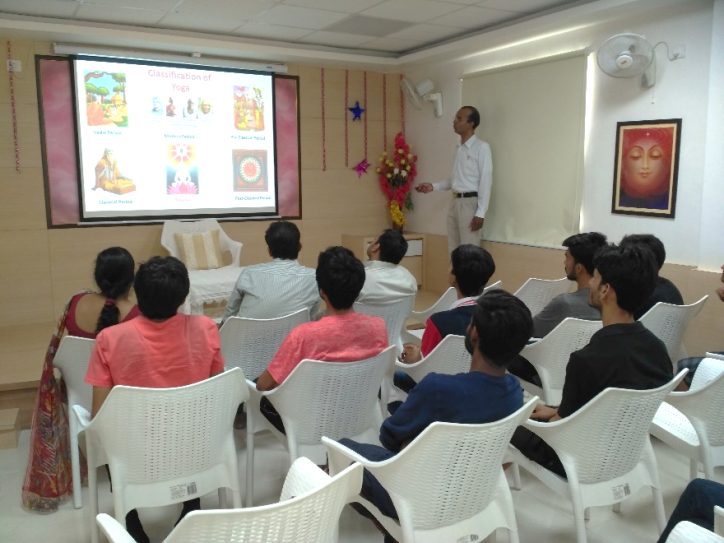


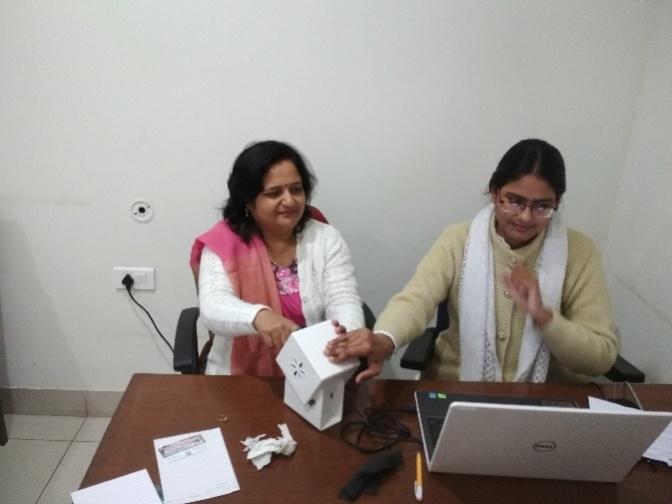

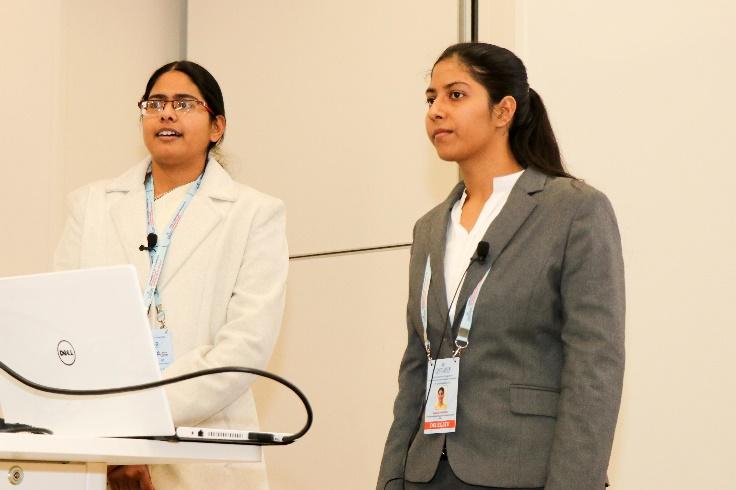
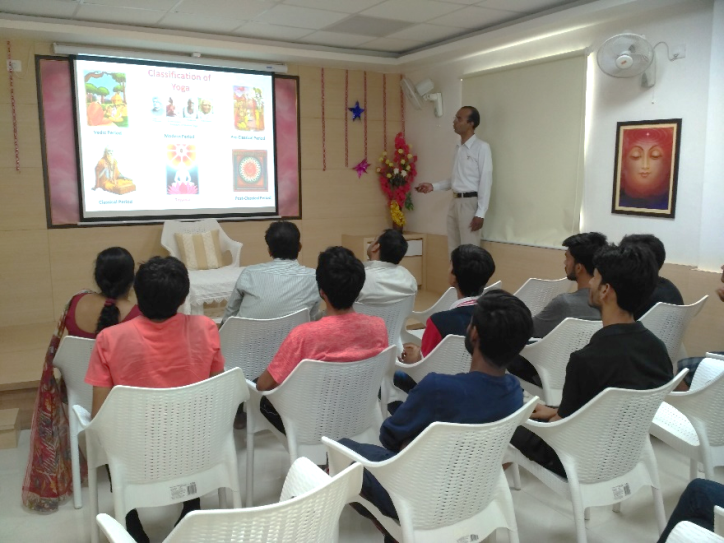
In this fast pacing world running behind the power of technology, there is a loss of awareness of Self and the Supreme power. The meaning of life has changed its definition from happiness to luxury. A pious place is created in JECRC to rejuvenate and re-establish the lost definition of Self and broken connection with the Supreme. It has a sound proof ‘Meditation Room’ developed as silence zone for meditation and self-contemplation. It also includes a Spiritual Library, with collection of best selling spiritual and inspirational books. Regular classes are conducted in Wisdom Hall which is designed as a smart classroom. A Research Laboratory for conducting research on meditation is equipped with EEG, EMG, Karadascan, Aura Scanning and other health monitoring devices. Mr. Mukesh Agarwal, Ms. Chitra Khandelwal and Ms. Aakanksha Desai are providing insight for the accomplishment of objectives of the Spiritual Cell.











Embroyo
A national level paper presentation contest Embryo was organized on 25th March 2018 which ignites innovative ideas and explored different Scientific & Technical researches. The participants proliferated their energies and presented research papers with full enthusiasm. Akshita Bhardwaj and Malvika Kushwah won first prize of Rs 2100. Embryo enhances stage skills of individual and helped in bringing out professionalism.




Enlightenment
A workshop on exploring the self through Meditation and Spirituality was conducted on 25th & 26th March 2018 by Spiritual Research Cell It was designed for young explorers who embark on journey of self-discovery. An exhibition on Science and Spirituality was also setup with main attraction of the concentration loop. Around four hundred people including students and staff members visited the exhibition in two days. Competition of ‘Know your Concentration’ was also conducted as a special event for the staff of JECRC and winners were awarded prizes and certificate of appreciation on 27th March 2018.



Hardware Assembling
A unique competition Hardware Assembling was organized on March 26th, 2018 to enhance the skills of PC assembling. Every team is required to assemble the CPU cabinet with all the required hardware tools within the limit of 5 minutes and if CPU boots then the team is considered to be qualified. The team of Bhavik and Akash took minimum time and won first prize of Rs. 11,000.
Javalets
A coding competition Java Lets involving the concepts of Java programming language was organized on March 25, 2018. The event observed a massive participation from different colleges also. Hackerearth evaluated the results on the basis of complexities and time of submission for the solutions of all the submissions.
Tech Probe
A technical quiz competition, Tech Probe was organized on March 26th, 2018 to test the technical knowledge of participants. A huge number of participants from all the departments grabbed the opportunity to showcase their talents. Instead of conventional methods of quiz, tech probe participants answered timed questions through their smartphones and winners were awarded cash prizes.
JustC
An event based on C programming language was organized on 27th March 2018. The event consists of two rounds – a Quiz as well as a Competitive Programming to test the understanding of C programming language and computer science fundamentals. It created the ability to solve problems inspired by real life situations. Saroj Kumar won the grand prize of Rs. 11,000 and five runner ups won cash prize of Rs. 2000 each.
New Venture
An annual Business Plan competition “NEW VENTURE” was organized by E-cell on March 28th, 2018. The event aimed to identify budding entrepreneurs that can contribute to the buzzing economy in the coming future. New Venture tested the skills of students in business plan.
Subito
A technical event based on the theme based web, mobile app development was organized on 28th March 2018. Participants prepared application (app) in a given time and showcased their app in front of panel of judges. Two competitions were organized in this event, Front End Ninja and Full Stack Ninja, where each competition has their own winning prizes. Abhishek Mohata & Akshita Vijay were the winners of Front End Ninja and Kunal Sarna and Kandarp Gupta won Full Stack Ninja competition.


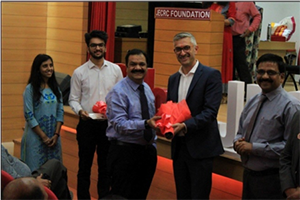

International Workshop on Active Learning & Opportunities in Higher Education Abroad
An International workshop was conducted on Nov. 01, 2017 by Dr. Niko Philips, Group Director – International, Activate Learning, City of Oxford College. He was accompanied by Mr. Amit Joshi, Advisor, GR Foundation. Prof. Phillips delivered a lecture on Active Learning and Opportunities in Higher Education abroad.
After the workshop, an MoU was also signed between Active Learning, City of Oxford College and JECRC for :-
Prof. Phillips also inaugurated a newly constructed academic block of JECRC and appreciated the state of the art infrastructure”. A token of remembrance, was presented to the honorable guests by the event coordinators Prof. (Dr.) Vijay Singh Rathore and Ms. Shikha Maheshwari in the end.

Workshop on Big Data
A workshop was conducted on Oct. 28, 2017 by Mr. Vimal Daga, Chief Technical Officer, Linux World Informatics Pvt. Ltd. Mr. Vimal Daga shared knowledge of Big Data with the participants to bridge the gap between academics and industry. Since every digital process and social media are generating Big Data all the times, and thus Big Data is arriving at an alarming rate, thus Mr. Vimal Daga enlightened the students with the strategies to handle large amount of data. 70 students from JECRC registered for the workshop.
EDC/IIPC Workshop
The Cell conducted 3 Days Entrepreneurship Program for entrepreneur development and for industry institution partnership during August 29, 2017 to August 31, 2017. 90 students enlightened with the program which emphasizes on EDP partners and associated organizations with the strategies to formulate innovative ideas and teams for a project. The workshop focused on LEAN Canvas Model and on final pitch preparation.
Workshop on Data Mining and Business Intelligence
NITTTR (ICT14) conducted workshop on Data Mining and Business Intelligence during September 4, 2017 to September 8, 2017 with the following objectives:
To know the clustering and classification algorithms and their experimentation using Weka The workshop shed light on Python Language for numerical calculations and for running data mining and machine learning algorithms. It enabled the participants to use Python for text and web mining, for visualization of experimental results and for connectivity of Python with various databases
Mongo DB Workshop
It is designed to cover a broad spectrum of topics on Mongo DB and non-relational databases geared towards learners from beginner to advanced levels. The course includes lessons on comparing and contrasting relational and non-relational databases, outlining the architecture of MongoDB, and detailing how to model data in a document-oriented database.
This material can be used in whole or in part to support a wide variety of instructional objectives, including learning best practices for querying data and structuring data models in MongoDB, and using features like transactions and aggregations. There are corresponding PDF versions available to implement. Each Session can be used for asynchronous learning, and or/ as complementary material to a MongoDB University course.
Many of the sessions include hands-on exercises utilizing the Mongo DB Web Shell or mongosh to increase student engagement and give real world practice. Quiz questions and answers on key concepts are embedded throughout the sessions to enhance knowledge retention.
Dr. Neeraj Prakash Shrivastava along with Ms. B Uma Maheshwari and Ms. Priyanka Mitra have successfully conducted this workshop for 6 days with around 200 Students of prefinal year.
One Day Workshop (AWS Cloud with AI)
25 Februrary2025
Speaker: Mr. Vimal Daga, Chief Technical Officer, Linux World Informatics Pvt. Ltd.
Faculty Coordinator : Dr. Vijeta Kumawat
The AWS AI Workshop was a successful event that provided participants with the tools, knowledge, and confidence to build and deploy AI solutions using AWS services. Attendees gained valuable hands-on experience confidence to build and deploy AI solutions using AWS services. Attendees gained valuable hands-on experience. with machine learning models, image/video processing, natural language processing, and chatbot development. with machine learning models, image/video processing, natural language processing, and chatbot development. The workshop also emphasized the scalability and security of AI applications on AWS, empowering participants to leverage these capabilities in their own organizations. Participants are encouraged to explore AWS AI services further and start building their own AI/ML applications.
A Report on One Week Short Term Course
On”ICT-85 -Data Science using Python”
Scheduled from
20th – 24th January, 2025
Faculty Coordinators
Dr. Sangita Choudhary (9772946612), Associate Professor, CSE Dept.
Ms. Kanika Bhutani (9996331017), Assistant Professor, CSE Dept.
Ms. Kusum Yadav (9024639556), Associate Professor, CSE Dept
This report aims to discuss about the Five days Short Term Course on “Data Science using Python ICT-85” scheduled from 20 – 24 January, 2025 at NITTTR, Chandigarh coordinated by Er. Shano Solanki Associate Prof., CSE through online mode. In this FDP many institutions participated along with JECRC Foundation.
Workshop on “The Enterprise Beast JAVA 2023-24″
Departmental Organizer:
Mr. Abhishek Jain (Assistant Professor, CSE Dept.)
Mr. Pradeep Kumar Sharma (Assistant Professor, CSE Dept.)
Ms. Kanika Bhutani (Assistant Professor, CSE Dept.)
The session started at 10:00 AM by welcoming of guest by Dr. Sanjay
Gaur (HOD, CSE). Mr. Yash Sharma started the session by introducing
the students about various types of technologies. The expert discussed
with the students about the JAVA and its application in current world.
He discussed each section in detail with proper example. He had also
shown various examples and differentiated between them. Dr. Vijeta
Kumawat, Dy. HOD, CSE Dept gave the vote of thanks to Mr. Yash
Sharma. At the end certificate of appreciation was presented to the expert.


International Conference on Emerging Trends in Expert Applications & Security (ICETEAS) 2018
Contributes to the society by serving the expert community seeking to stimulate the development to improve lives throughout the world by providing innovative results.

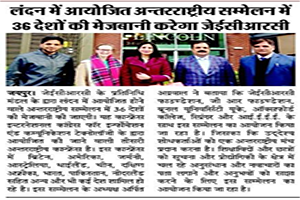


International Congress on Information and Communication Technology (ICICT) 2018
Informative Seminar presentations were conducted by ECE department on HCIG program, aimed for Engineering students, where participants get trained & certified by Huawei on multiple leading ICT technologies such as Wireless (2G, 3G, LTE), Core network



National Conference on Recent Trends in Computing & Communications (RTCC) 2018
Date of the event:March 26-27, 2018
Venue:Jecrc foundation
Objectives:
To provide opportunistic platform to researchers to exchange state-of-the-art knowledge.
To understand issues and challenges in the current trends of research.
To disseminate knowledge and share experience of emerging technologies.
To formulate appropriate and effective strategies towards the innovative advancements in Computing & Communications
Outcome:The conference enlightened participants about advancing trends in Computing & Communication with issues and challenges towards innovative developments.
Seminars
International Seminar on Higher Education Opportunities in UK for Engineering Students
Dr. SanjeevOhri, Vice Principal, Dudley College, UK visited the JECRC Foundation on September 21, 2017. He interacted with JECRC students and explored the possibilities with students and faculty exchange program with Dudley College, UK. He visited spiritual cell and also inaugurated the Mechanical Workshop. A token of remembrance, was presented to the honorable guests by the event coordinators Prof. (Dr.) Vijay Singh Rathore and Dr. Bhavna Sharma in the end.
International Seminar on Outcome Based Education
Dr Peter H Kent, CEO, UKEI, London with his colleague, Dr David Wing, Director, UKEI visited JECRC, Jaipur on November 9, 2017 for a discussion on Outcome Based Education for 21st centennial engineering students. Faculty members got benefitted with their words of wisdom on the current scenario of engineering education and the demand of upcoming time.A token of remembrance, was presented to the honorable guests by the event coordinators Prof. (Dr.) Vijay Singh Rathore and Ms. Shikha Maheshwari in the end.
National Seminar on Improving Faculty API
Prof. (Dr.) P. K. Mishra, Institute of Science, Department of Computer Science, Banaras Hindu University, Varanasi conducted a seminar on improving Faculty API on November 23, 2017. The session turned as an interactive one as discussion was based on significant contributions in the classroom teachings. The session ended with the vote of thanks and a token of remembrance to the honorable guest by Prof. (Dr.) Vijay Singh Rathore.
Visit to Tedstart, Jaipur
TAn industrial visit was organized to Tedstart, Jaipur on August 31, 2017. Tedstart is a joint initiative of Startup Oasis and Department of Technical Education, Government of Rajasthan, which will foster entrepreneurship in 7 regions of Rajasthan by providing special startup support programs to solve obstinate problems of the state. 64 students of JECRC visited Tedstart campus at Department of Technical Education, Govt. of Rajasthan (Center for Electronic Governance), Jaipur and learn how to tap into the pool of entrepreneurship to solve persistent problems.
Recent achievements of Faculties

Mr. Mukesh Agarwal

Mr. Gajendra Sharma

Dr. Sanjay Gaur

Dr. Nilam Choudhary

Ms. Manju Vyas

Mr. Abhishek Dixit
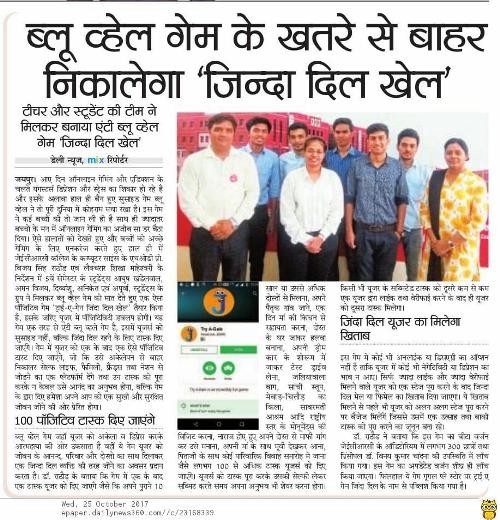
The Game app was launched on October 12, 2017 on Google PlayStore :
Get app here
1 Lakh subscribers on YouTube
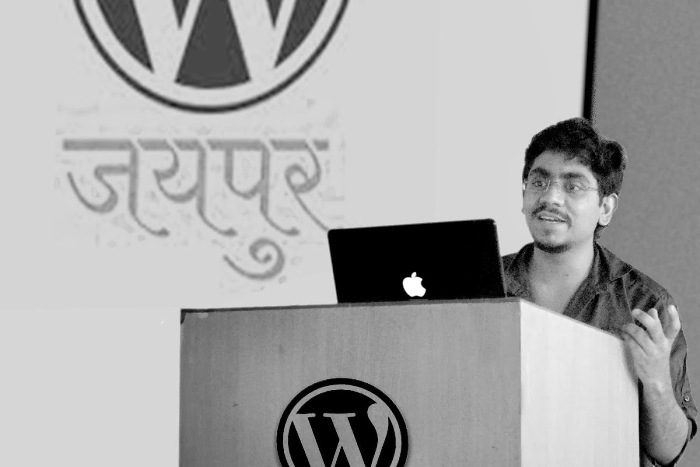
Akshay Patni from 4th year CSE, completed 100+ SEO Projects of Global Websites in Education, Health and Yoga Niche and sold 31 Websites with the hiring of paid 50+ interns from different colleges of the country including Bits Pilani and IIM Lucknow. He is also the founder of Lifehawn.com, a self improvement blogging platform. He is the Marketing Head of Rehabyoga, a website of India’s renowned Yoga Trainer, Gaurav Negi. Apart from being techno geek, he has also delivered session as a SEO Speaker by WordPress Jaipur Team. These achievements reveals dedication and efforts put up by Akshay to become a diverse engineer.
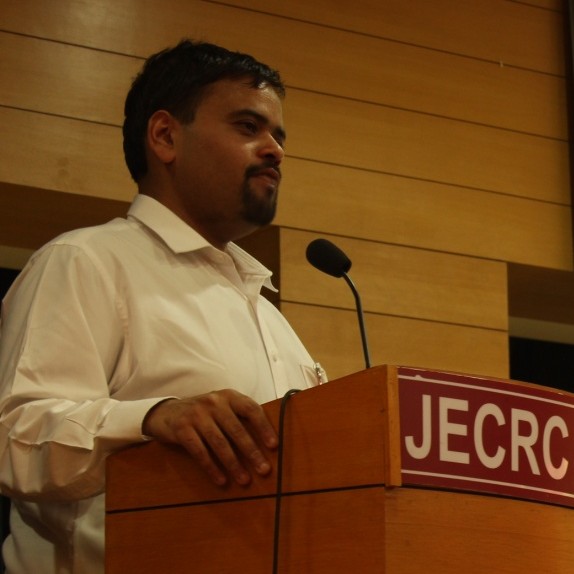
Nitendra Mathur (Batch-2004)
From the very first batch of JECRC, Nitendra Mathur was a powerful speaker and debater but was a casual chap in academics. He was not much clear about what he actually wanted to take up in future, he was one of those curious backbenchers but did not make his mind until his MBA, he sat for interviews just because he wanted to have a job on day zero so that he could be free from rest of the interviews, the only that made him win things was his unmatchable confidence, and his never say no attitude and today, he is working as VP-DBS Treasures offshore desk Head, Singapore.
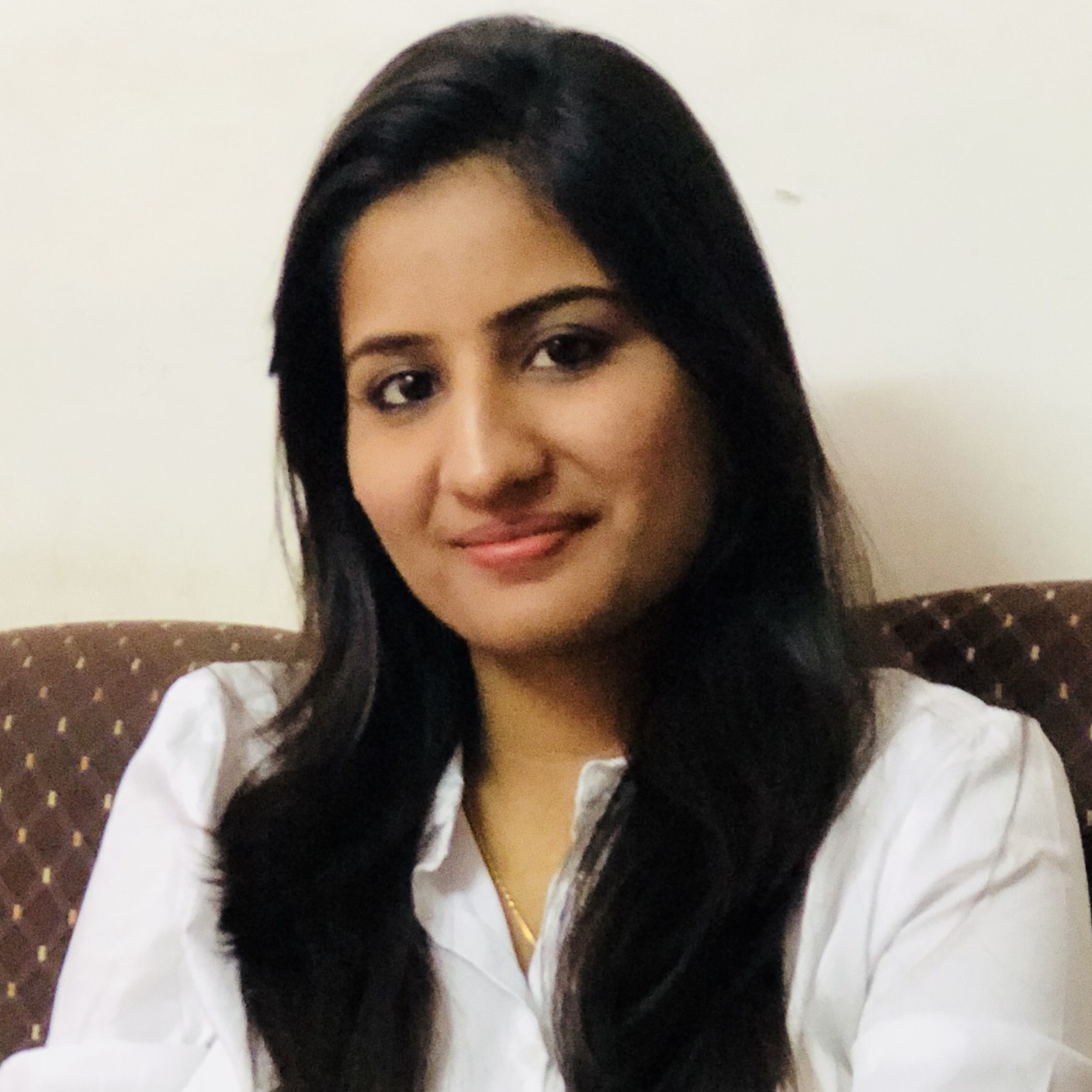
Srishti Jain (Batch-2015)
Be very clear in your goals. There should be only one goal at a time. The more clear you are about what you want, the more likely you are to achieve it. My only goal, dedication, hard work and disciplined life is all behind my success. IF NOT US THEN WHO, IF NOT NOW THEN WHEN… Everyone is a perfect piece of god
Aditya Pokharna,Microsoft (Batch-2009)
“Here at JECRC you get profound knowledge and adequate exposure to the latest technology in industry. Knowledgeable and passionate teachers always encourage and are ready to help whenever needed. The college emphasizes not only on theoretical but also the practical aspect of learning and education by conducting seminars and workshops in the campus and provides with an environment which motivates the students to keep thriving and work hard relentlessly.”
Utkarsh Nagpal, Heal Nectar
“My dream of becoming an entrepreneur and running a business which is doing fairly well currently wouldn’t have been possible without the support of college. My faculty and mentors helped me in maintaining good academic record and learning about business at the same time. Sessions with flourished and upcoming entrepreneurs and extensive research guidance helped in getting an idea of real world and the competition.”
To request additional information concerning alumni of our department, you can reach us at:
Training & Placement Officer
Department of Computer Science & Engineering

Placements 2024

Placements 2023

Placements 2018-25
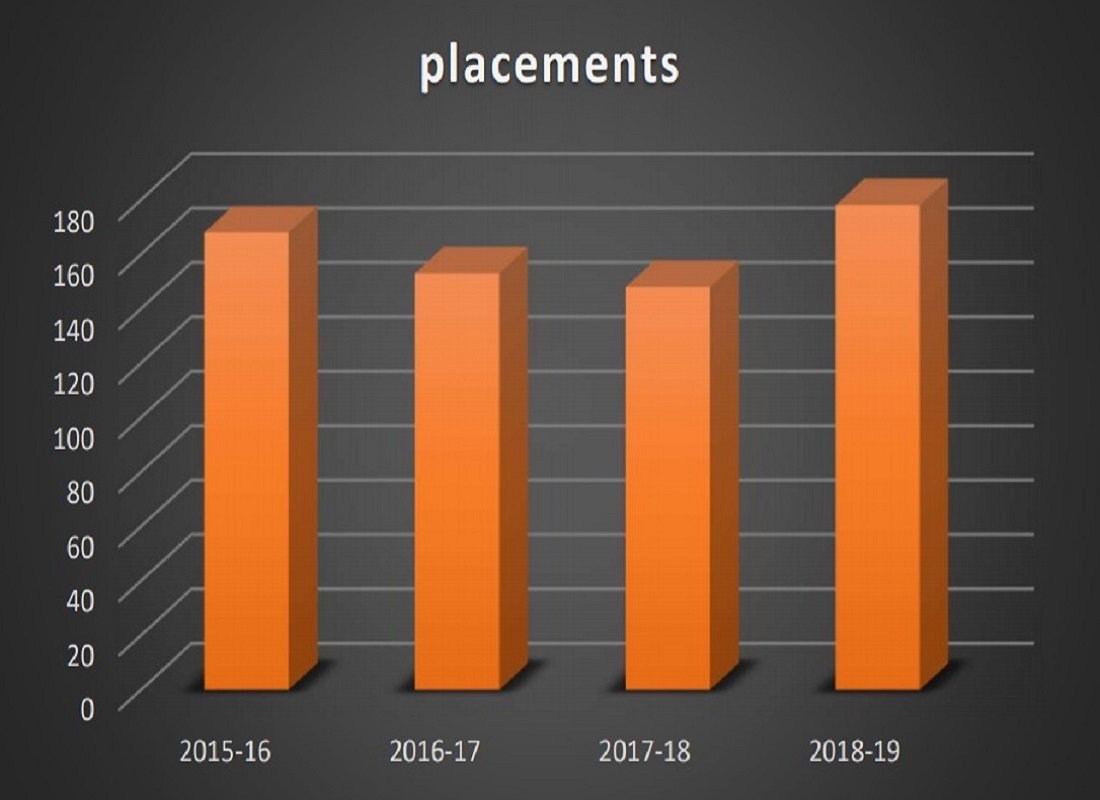
Placements 2015-19
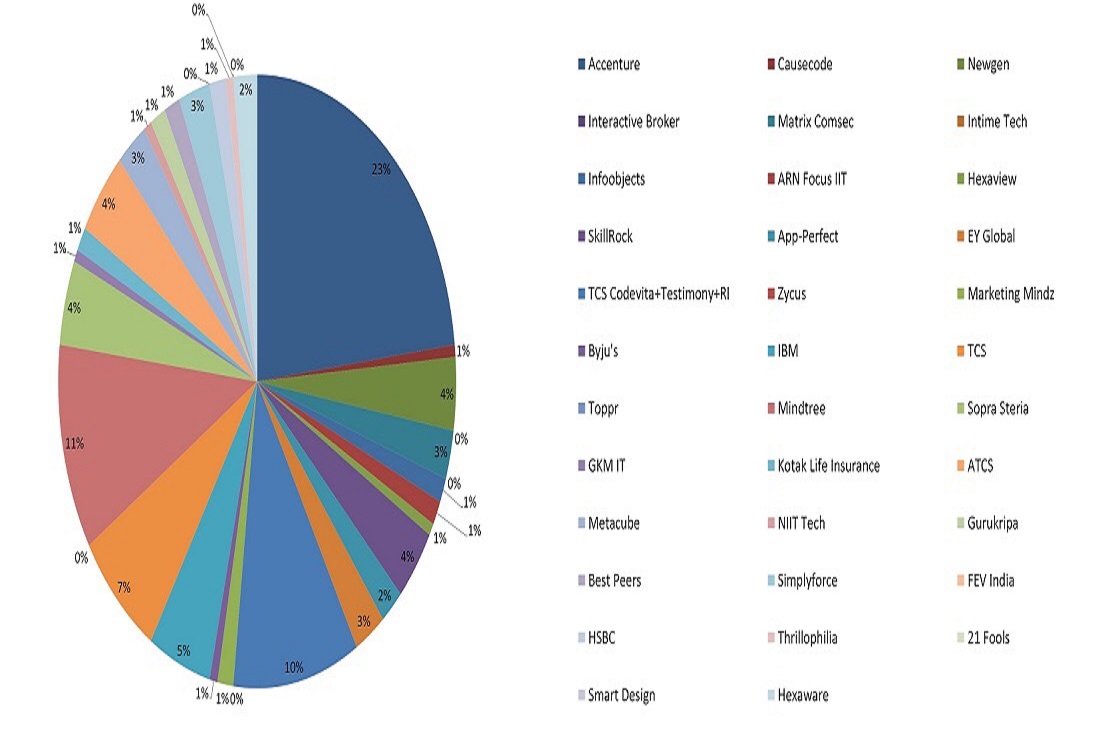
Placements 2017-18
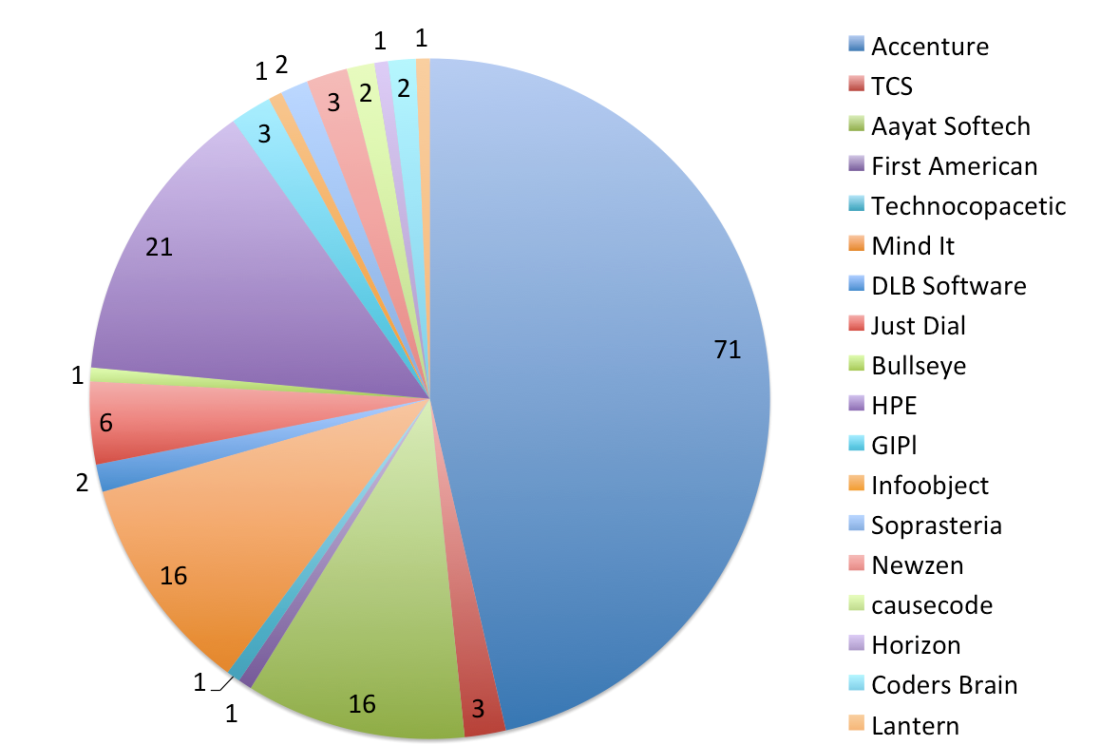
Placements 2016-17
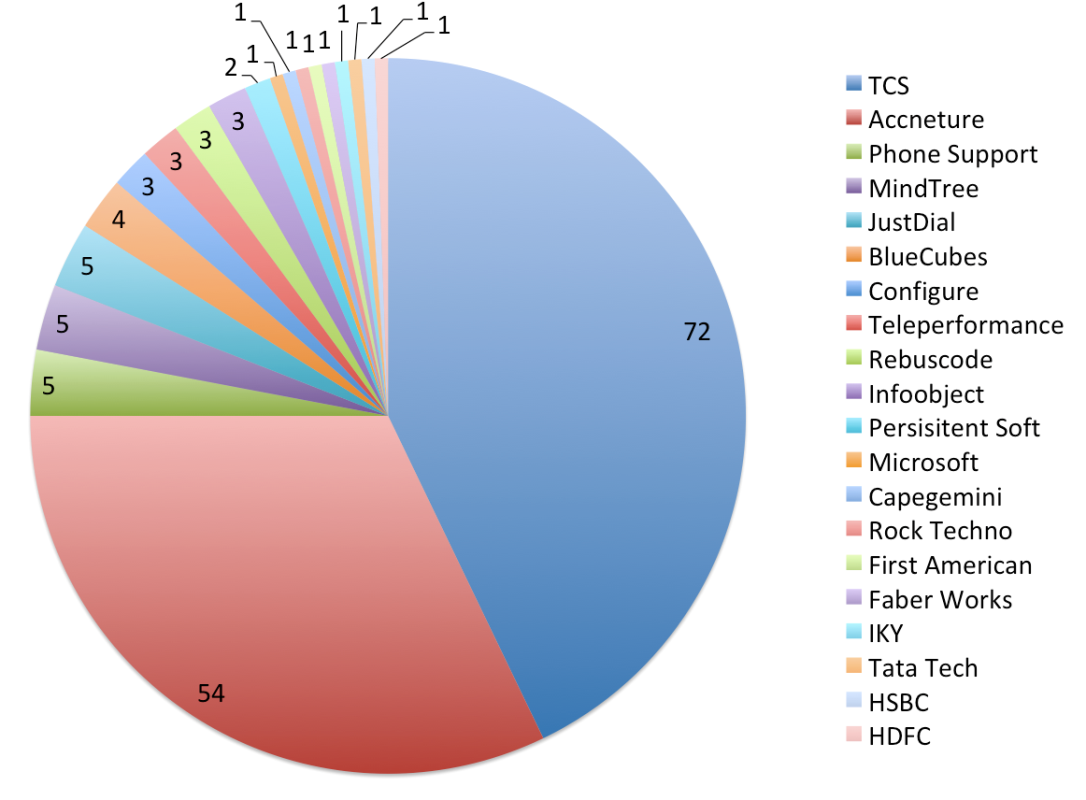
Placements 2015-16

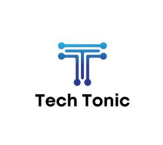
Tectonic Club, an organization dedicated to providing a platform for students to explore and learn from various industries. Our mission is to bridge the gap between academic and industry, fostering a deeper understanding of the real-world applications of our studies. Through our industrial visits, workshops, and seminars, we aim to provide students with a deeper understanding of the industry and its applications. Our club is open to students from all disciplines, and we encourage everyone to join us on this exciting journey of exploration and discovery. The main objective is that:
– Organize regular industrial visits to renowned companies and institutions
– Provide a platform for students to interact with industry professionals and experts
– Foster a culture of innovation, entrepreneurship, and collaboration among students
– Enhance students’ knowledge, skills, and employability in their chosen fields
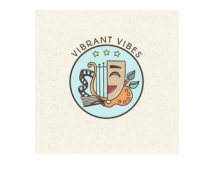
Functioning of the Vibrant Vibes
The Non-Technical Club under the Department of Computer Science and Engineering serves as a platform to nurture creativity, leadership, and interpersonal skills among students. The club organizes various events, workshops, and activities to promote teamwork, innovation, and cultural exchange, enriching the holistic development of students. Objectives of the Vibrant Vibes:
Learn, Code, Contribute, Collaborate.
Codedocs is open source student coding community of JECRC, completely managed and operated by students thriving to bring change.
Throughout the year, students organise courses (Android, Web, Data Science etc) , events, workshops, competitions, contests etc in different domains.
CodeDocs transform students to industry experts through skills, practical programming, and working in teams. Students work together, network and learn, and solve some real challenges.
CodeDocs major initiatives:
With CodeDocs, students of JECRC work together and enhance their skills to become better Software developers while enjoying to Code ?? ??.
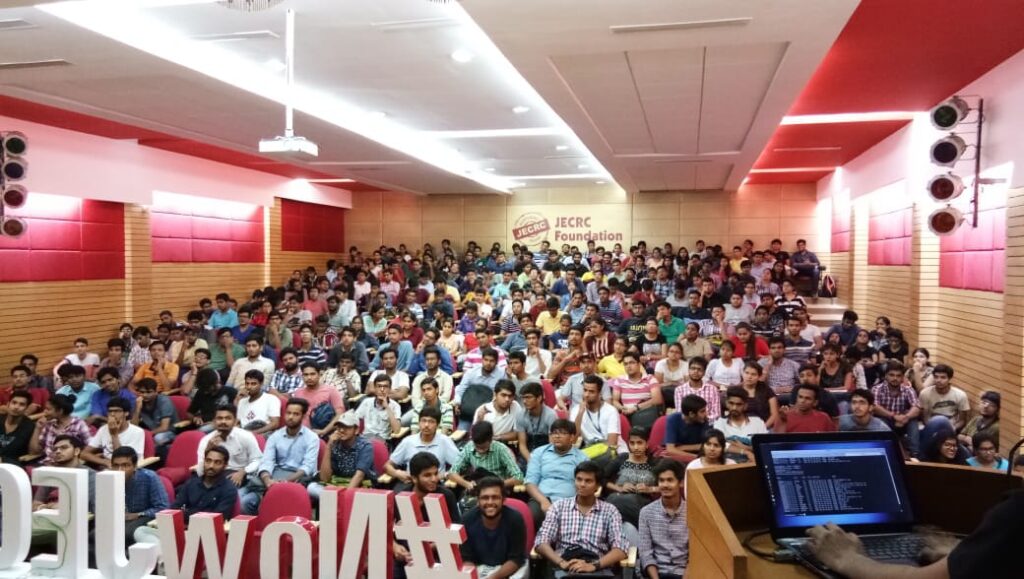
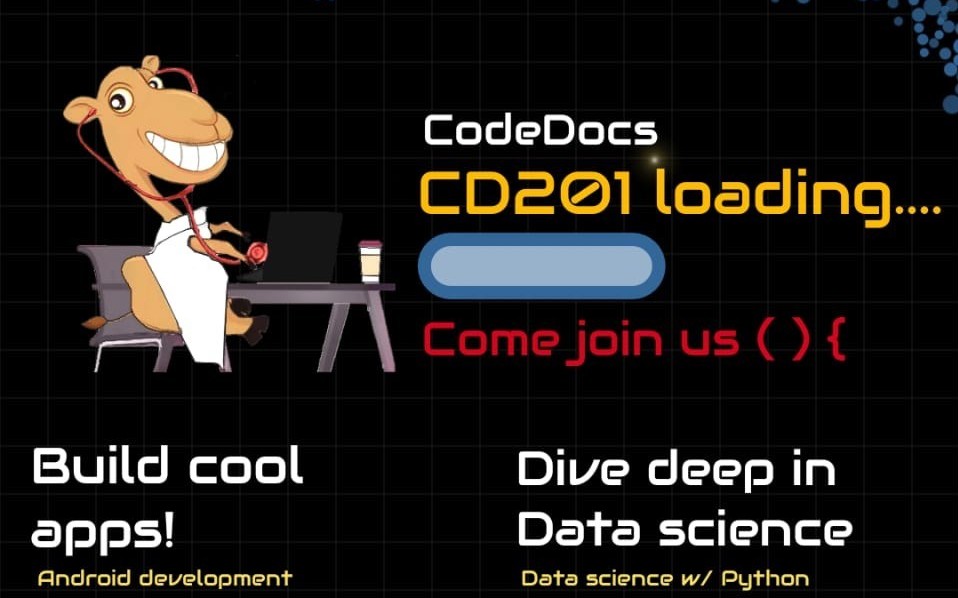
JECRC’s AI Leap: Rajasthan’s First Centre of Excellence in AI
JECRC College, Jaipur, proudly launches Rajasthan’s FIRST Centre of Excellence in Artificial Intelligence, revolutionizing AI education and innovation. Designed to bridge the gap between academia and industry, the Centre offers hands-on learning, real-world AI applications, and globally recognized certifications through AI CERTs™ USA.
Backed by industry giants like Microsoft and Cisco, the initiative ensures future-proof skills for both engineering students and professionals from non-tech backgrounds. With flexible online learning, expert mentorship, and an inclusive approach, JECRC is making AI accessible to all.
Aligned with AI CERTs™’ vision to empower a billion people, this initiative positions Jaipur and Rajasthan at the forefront of the global AI revolution. A special thanks to Prof. (Dr.) Vinay Chandna, Manish Jain, Dr. Fauzia Siddiqui, and Dr. Vijeta Kumawat for driving this transformative collaboration.
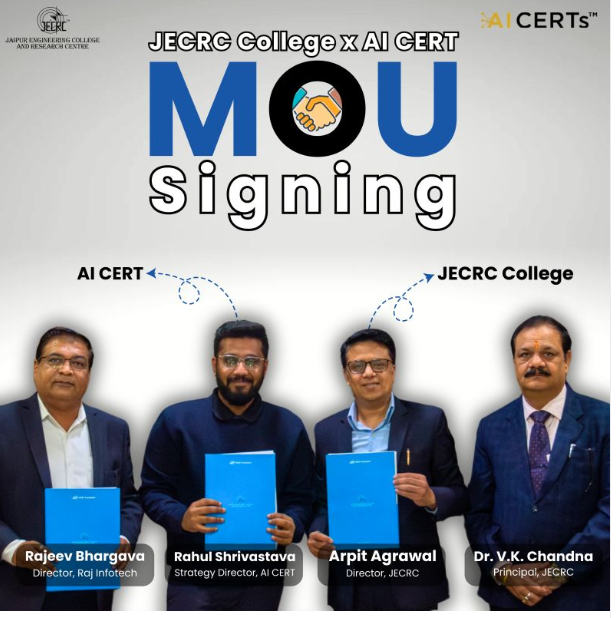
The basic idea of this initiative is to develop a coding ecosystem in our campuses and to make every student passionate about competitive programming. This includes all-round development in technical and core subjects and boosts the overall performance of JECRCians in the upcoming competitions. The knack of programming not only drives one to the best Internship opportunities but also helps one to grab better placement opportunities in the product-based companies like “FAANG” (Facebook, Apple, Amazon, Netflix and Google) and startups with packages ranging 10 LPA and more.
We have conducted an internal test with the collaboration with Code Chef for around 3000 students and selected 270 out of them and provide them special high-quality training of 150 Hours by Industrial experts.
S. No | Types of Feedbacks | Session (2019-20) | Session (2020-21) |
1 | Student’s Curriculum Feedback Form | View | View |
2 | Students Feedback On Teaching Learning | View | View |
3 | Students Extra-Curricular Feedback Form | View | View |
4 | Parent’s Feedback Form | View | View |
| 5 | Student’s Facility Feedback Form | View | View |
| 6 | Student’s Hostel Facility Feedback Form | View | View |
| 7 | Student’s Feedback(Transport Facility) Form | View | View |
| 8 | General Feedback Form | View | View |
| 9 | Student’s Course Outcome Feedback Form | VIew | View |
| 10 | Student’s Program Exit Feedback Form | View | View |
| 11 | Employee Feedback Form | VIew | View |
| 12 | Industrial Training Feedback Form | VIew | View |
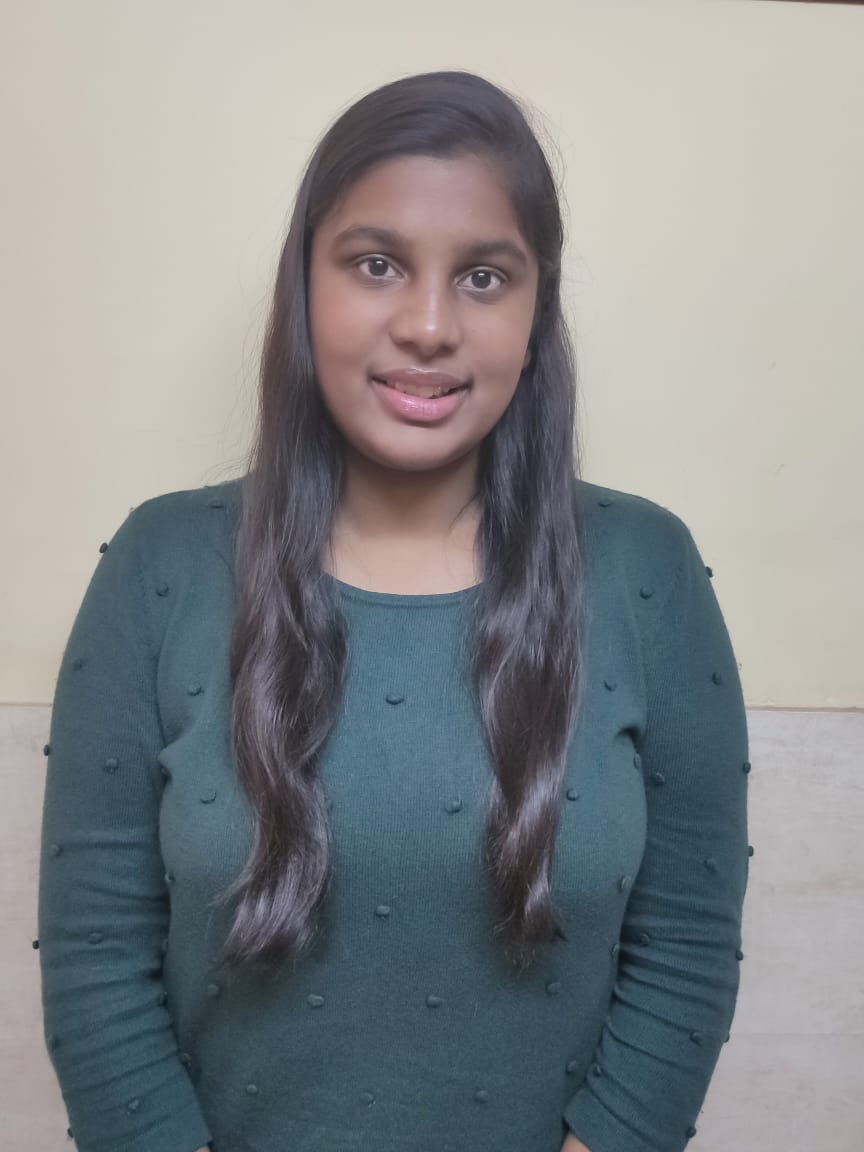
82.86%
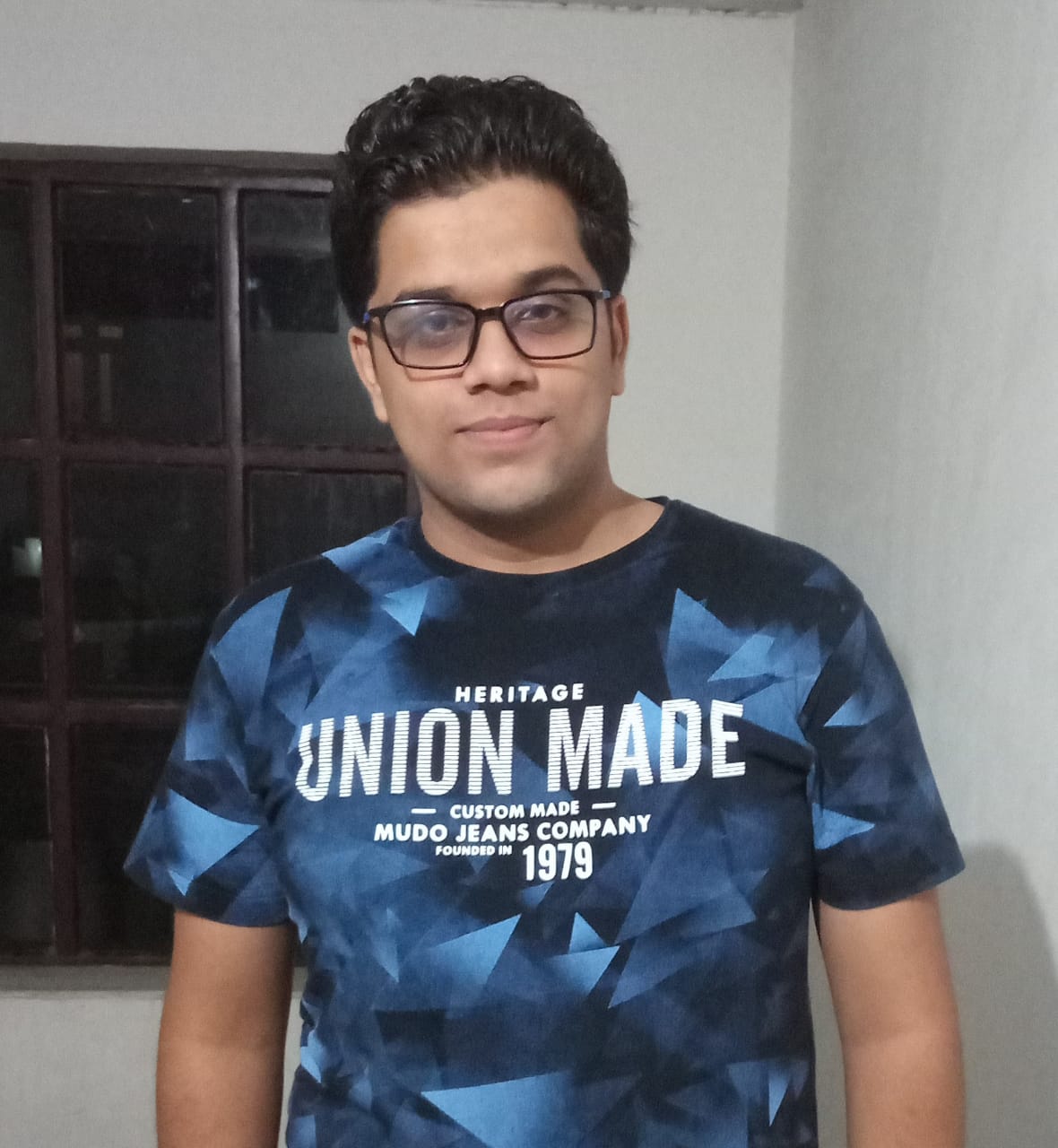
86.17%
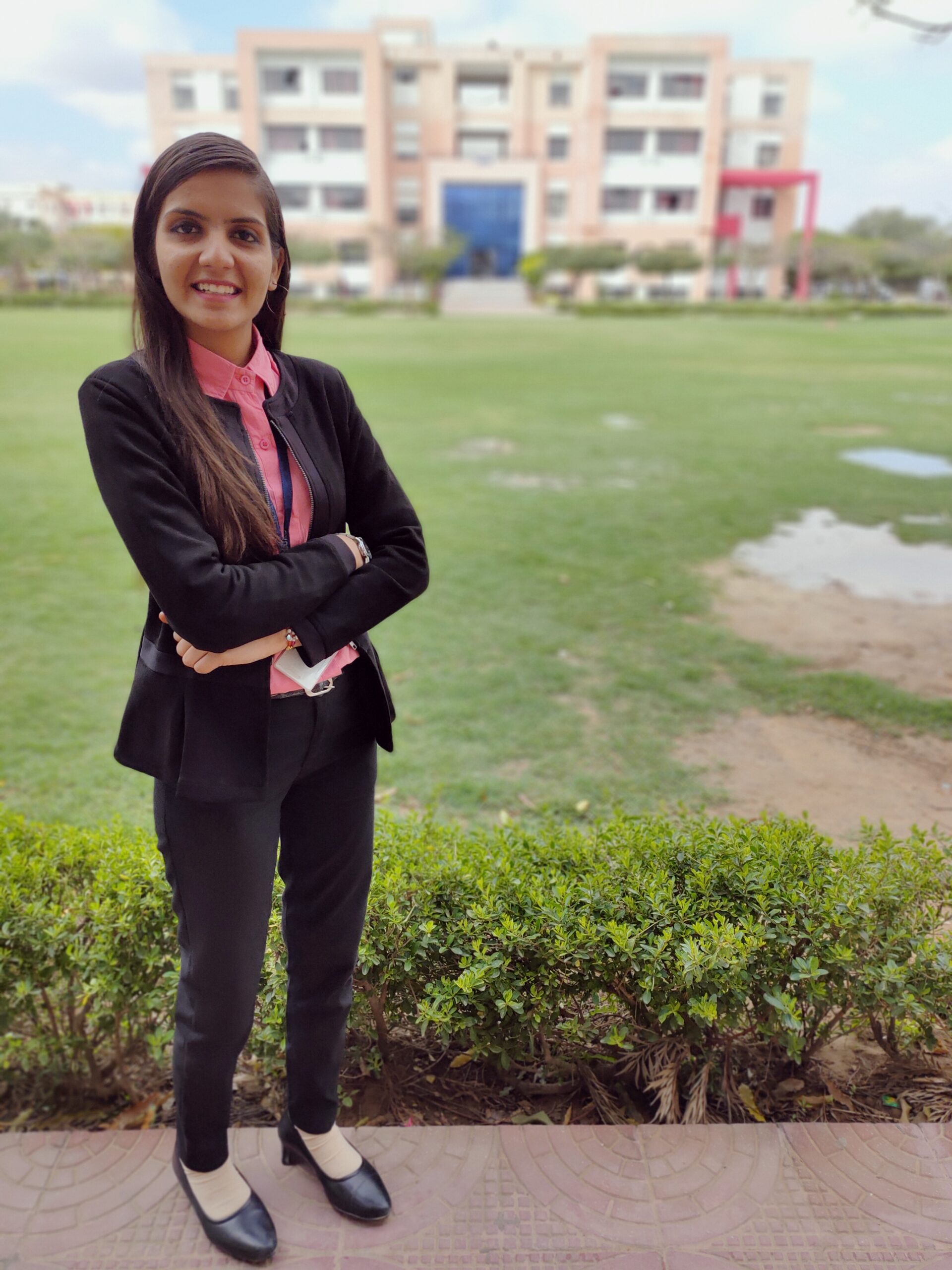
85.40%

88.00%
There are different eligibility requirements for other courses/programs. Further details can be found on your desired course or program page.
The tuition and registration fees are applicable as per the choice of discipline and program along with hostel and mess charges under the hostel fee. For the hostel fee details, please see the hostel page.
Depending upon your choice of discipline and program, the undergraduate courses can be 3 to 5 years, the postgraduate courses of 1 to 2 years, the research programs from 3 to 5 years, and the diploma/certificate courses are of 3 months to 3 years duration.
JECRC is a residential institute and all students who are admitted are accommodated in hostels. You can find out more about our hostel accommodation here Hostels.